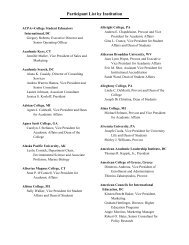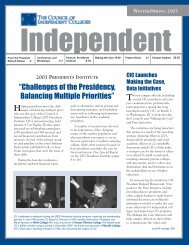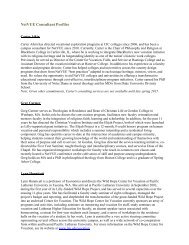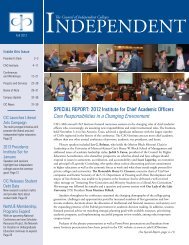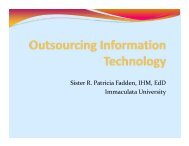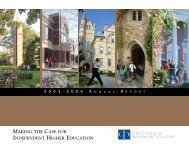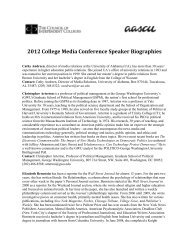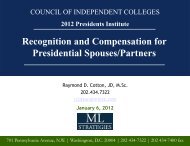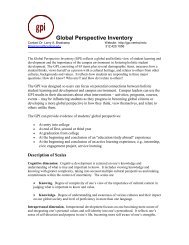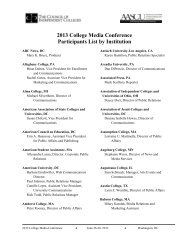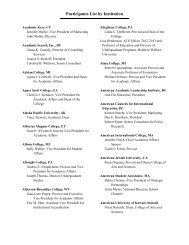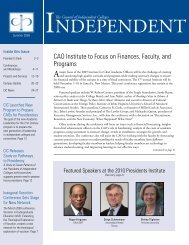2012 CAO Institute - The Council of Independent Colleges
2012 CAO Institute - The Council of Independent Colleges
2012 CAO Institute - The Council of Independent Colleges
You also want an ePaper? Increase the reach of your titles
YUMPU automatically turns print PDFs into web optimized ePapers that Google loves.
40 th Annual <strong>Institute</strong> for Chief Academic OfficersCore Responsibilities in a Changing EnvironmentSan Antonio, Texas • San Antonio Marriott Rivercenter Hotel • November 3–6, <strong>2012</strong> CONFERENCE PROGRAM • www.cic.edu/<strong>2012</strong><strong>CAO</strong><strong>Institute</strong>
SponsorsCIC is grateful to the following sponsors for their support <strong>of</strong> the <strong>2012</strong> <strong>Institute</strong> for Chief Academic Officers:PremierTIAA-CREFDonorAmerican Academic Leadership <strong>Institute</strong>Capital EducationInside Higher EdInterfolio, Inc.Jenzabar, Inc.ContributorAcademic KeysAusten GroupCasagrande Consulting, LLCGoal Success/Education PracticeLiveTextML Strategies, LLC/Mintz, Levin, Cohn, Ferris,Glovsky & Popeo LLCNBC LearnNew Ventures <strong>of</strong> Regis UniversityRPA Inc.Registry for College and University PresidentsStamatsStevens Strategy<strong>The</strong> Chronicle <strong>of</strong> Higher Education<strong>The</strong> IDEA Center<strong>The</strong> Learning House, Inc.<strong>The</strong> New York TimesSupporterHyatt-Fennell, Executive SearchCIC acknowledges with appreciation the continuing support <strong>of</strong> Academic Search, Inc.Table <strong>of</strong> ContentsSchedule-at-a-Glance..........................................1Workshop for New Chief Academic Officers .............5Workshop for <strong>CAO</strong>s in <strong>The</strong>ir Thirdor Fourth Year <strong>of</strong> Service.....................................8Pre-<strong>Institute</strong> Events..........................................10Saturday, November 3.......................................11Sunday, November 4.........................................13Monday, November 5 ........................................26Tuesday, November 6........................................37Post-<strong>Institute</strong> Events.........................................41Hotel Information ...........................................42<strong>CAO</strong> Task Force..............................inside back coverRiver Walk
Schedule-at-a-GlanceSATURDAY, NOVEMBER 3Pre-<strong>Institute</strong> Events7:30 a.m.–5:00 p.m.<strong>Institute</strong> Registration and IdeaExchangeRegistration Foyer7:30 a.m.–4:30 p.m.WORKSHOP—New ChiefAcademic OfficersSalon J7:30 a.m.–4:00 p.m.WORKSHOP—<strong>CAO</strong>s in <strong>The</strong>irThird or Fourth Year <strong>of</strong> ServiceConference Rooms 17–189:00 a.m.–3:00 p.m.Mennonite <strong>Colleges</strong> ChiefAcademic OfficersConference Room 16Noon–4:00 p.m.TIAA-CREF ConsultationsConference Room 92:00–5:00 p.m.<strong>Council</strong> for Christian <strong>Colleges</strong>& Universities Chief AcademicOfficersConference Room 72:30–4:30 p.m.Catholic College and UniversityChief Academic OfficersRoundtable and Update fromAssociation <strong>of</strong> Catholic <strong>Colleges</strong>and UniversitiesConference Room 113:00–4:00 p.m.<strong>CAO</strong> Mentors MeetingConference Room 193:30–4:00 p.m.<strong>CAO</strong> Task Force MeetingConference Room 164:00–4:30 p.m.Mentors Meet New <strong>CAO</strong>sSalon J<strong>Institute</strong> Begins5:00–6:30 p.m.WELCOME AND KEYNOTEADDRESS—Lee G. BolmanSalon H6:30–7:15 p.m.Welcoming ReceptionSalon I Foyer7:15–9:00 p.m.Buffet DinnerSalon ISUNDAY, NOVEMBER 47:00 a.m.–5:00 p.m.<strong>Institute</strong> Registration and IdeaExchangeRegistration Foyer7:15–7:45 a.m.Roman Catholic MassConference Rooms 1–28:15–8:45 a.m.Ecumenical Worship ServiceConference Rooms 1–27:30–8:45 a.m.Breakfast DiscussionsSalon I8:00 a.m.–5:00 p.m.TIAA-CREF ConsultationsConference Room 98:00 a.m.–5:00 p.m.<strong>CAO</strong> Spouses HospitalityRoomConference Room 89:00–10:00 a.m.PLENARY SESSION—Honorable Henry G. CisnerosSalon H10:15–11:45 a.m.Welcome C<strong>of</strong>fee for <strong>CAO</strong>SpousesConference Room 810:30–11:45 a.m.CONCURRENT SESSIONSAcademic Program Review:What Happens to the Results?Conference Rooms 1–4Access and Success for First-Generation StudentsConference Rooms 17–18Developing New DegreeProgramsSalons K and LHow to Determine ifRetirement Incentives AreWorkingSalon IRestructuring Academic AffairsSalon M11:45 a.m.–1:30 p.m.Free Time for LunchNoon–1:30 p.m.Women Chief AcademicOfficers Luncheon andDiscussion GroupsSalon Hwww.cic.edu/<strong>2012</strong><strong>CAO</strong><strong>Institute</strong> • 1
1:30–2:45 p.m.CONCURRENT SESSIONSFaculty CompensationConference Rooms 1–4Making Effective Use <strong>of</strong>Department and DivisionChairs as Critical Links inAcademic AdministrationSalon MNew Approaches andProcedures in TeacherEducation ProgramsConference Rooms 13–14Presidential Leadership—Opportunities and ChallengesConference Rooms 17–18Preventive Law I: Managing theHiring ProcessSalons K and LSteps in the Strategic PlanningProcessSalon I3:00–4:15 p.m.CONCURRENT SESSIONSChief Academic Officers OpenMikeConference Rooms 1–4Communicating FinancialRealities to Faculty Membersby Using CIC’s FinancialIndicators Tool (FIT) and KeyIndicators Tool (KIT)Conference Rooms 17–18Divide and Conquer—<strong>The</strong>Responsibilities <strong>of</strong> AssociateProvosts and Associate VicePresidentsSalon IPay Attention to Process:Revising the General EducationProgramSalon HPreventive Law II: BestPractices in EmployeeEvaluationSalons K and L4:30–5:30 p.m.<strong>CAO</strong> Mentor Program (For New<strong>CAO</strong> Workshop participants only)Salon I4:30–5:30 p.m.CONCURRENT SESSIONSApproaches to IncreasingStudent RetentionConference Rooms 1–4Many Cultures on the SanAntonio RiverSalons K and LWriting a SuccessfulApplication for a CIC-FundedProgramConference Room 76:15 p.m.Dine-around Dinners(Meet in the hotel lobby.)MONDAY, NOVEMBER 57:00 a.m.–5:00 p.m.<strong>Institute</strong> Registration and IdeaExchangeRegistration Foyer7:30–8:45 a.m.Annapolis Group ChiefAcademic Officers BreakfastConference Room 77:30–8:45 a.m.Breakfast DiscussionsSalon I7:30 a.m.–5:00 p.m.<strong>CAO</strong> Spouses HospitalityRoomConference Room 87:30–8:45 a.m.<strong>CAO</strong> Spouses BreakfastDiscussionsConference Room 88:00 a.m.–5:00 p.m.TIAA-CREF ConsultationsConference Room 99:00–10:00 a.m.PLENARY SESSION—JudithS. EatonSalon H10:15–11:30 a.m.<strong>CAO</strong> Spouses DiscussionSessionsConference Room 810:15–11:15 a.m.CONCURRENT SESSIONS<strong>The</strong> <strong>CAO</strong>’s Duty to Build Trustand Maintain IntegrityConference Rooms 1–4<strong>The</strong> CIC Degree QualificationsPr<strong>of</strong>ile ConsortiumConference Rooms 13–14Civic Engagement andInstitutional MissionSalon MDealing with Difficult FacultyColleaguesSalon ILeading Entrepreneurial EffortsSalons K and L11:30 a.m.–12:30 p.m.CONCURRENT SESSIONSAdvancing InterfaithCooperationSalon IAnother Perspective onAcademic Program Review:What Happens to the Results?Conference Rooms 1–4<strong>The</strong> CIC Degree QualificationsPr<strong>of</strong>ile Consortium (repeatedsession)Conference Rooms 13–142 • <strong>Institute</strong> for Chief Academic Officers
Success with First-GenerationTransfer StudentsSalons K and LUsing Smart Technology toIncrease Course Offerings inWorld LanguagesSalon M12:30–1:30 p.m.Free Time for Lunch12:30–1:30 p.m.Association <strong>of</strong> <strong>Colleges</strong> <strong>of</strong>Sisters <strong>of</strong> Saint JosephChief Academic OfficersConference Room 712:30–1:30 p.m.Missouri Chief AcademicOfficers Luncheon(Meet in the hotel lobby.)12:30–2:00 p.m.Conference for Mercy HigherEducation Chief AcademicOfficersConference Room 1512:30–2:00 p.m.Women’s College CoalitionLuncheon for Chief AcademicOfficersSalon J1:30–5:30 p.m.Optional Excursion—SanAntonio Missions Tour(Meet in the hotel lobby.)2:00–4:00 p.m.Focus Group on CivicEngagementConference Rooms 1–42:00–4:30 p.m.WORKSHOP—Seminar forExperienced <strong>CAO</strong>sSalons K and L2:00–5:00 p.m.WORKSHOP—BudgetFundamentals for the <strong>CAO</strong>Salon IMarket Square5:30–6:30 p.m.Reception for Members <strong>of</strong> theCIC/DQP Consortium(By invitation only)Conference Room 176:30 p.m.Free Time for Dinner6:30 p.m.MEETINGS OFASSOCIATEDORGANIZATIONSAmerican Benedictine <strong>Colleges</strong>Chief Academic Officers(Meet in the hotel lobby.)Association <strong>of</strong> Dominican<strong>Colleges</strong> and Universities ChiefAcademic Officers(Meet in the hotel lobby.)Association <strong>of</strong> Franciscan<strong>Colleges</strong> and Universities ChiefAcademic Officers(Meet in the hotel lobby.)Association <strong>of</strong> Presbyterian<strong>Colleges</strong> and Universities ChiefAcademic Officers(Meet in the hotel lobby.)<strong>Council</strong> for Christian <strong>Colleges</strong>& Universities Chief AcademicOfficers(Meet in the hotel lobby.)National Association <strong>of</strong> Schoolsand <strong>Colleges</strong> <strong>of</strong> the UnitedMethodist Church ChiefAcademic Officers and SpousesConference Room 12National <strong>Institute</strong> forTechnology in LiberalEducation (NITLE) ChiefAcademic OfficersConference Room 18www.cic.edu/<strong>2012</strong><strong>CAO</strong><strong>Institute</strong> • 3
TUESDAY, NOVEMBER 67:00 a.m.–Noon<strong>Institute</strong> Registration and IdeaExchangeRegistration Foyer7:30–8:45 a.m.Historically Black <strong>Colleges</strong> andUniversities Breakfast for ChiefAcademic OfficersSalon H7:30–8:45 a.m.Breakfast DiscussionsSalon H8:00 a.m.–NoonTIAA-CREF ConsultationsConference Room 98:00 a.m.–Noon<strong>CAO</strong> Spouses HospitalityRoomConference Room 89:00–10:15 a.m.CONCURRENT SESSIONSEvaluating Academic AdvisingConference Rooms 17–18Faculty WorkloadConsiderationsSalon IOpportunities to DevelopLeadership within the FacultySalons K and LSmart Internationalization:Be Strategic about GlobalExpansionConference Rooms 13–1410:45 a.m.–NoonCLOSING PLENARYSESSION—Lucie LapovskySalon HNoon<strong>Institute</strong> AdjournsPOST-INSTITUTEEVENTS12:15–3:00 p.m.<strong>CAO</strong> Task Force MeetingConference Room 121:00–5:00 p.m.CIC/Aspen/Wye Seminaron Leadership and LiberalEducation in a Global ContextConference Rooms 17–181:30–5:30 p.m.Optional Excursion—KingWilliam Food Tour(Meet in the hotel lobby.)Majestic <strong>The</strong>atre4 • <strong>Institute</strong> for Chief Academic Officers
Workshop for New ChiefAcademic OfficersSponsored by Jenzabar, Inc.Saturday, November 37:30 a.m. Continental BreakfastSalon J8:00–8:05 a.m. WelcomeGinny Coombs, Vice President for Annual Programs, CIC8:05–8:45 a.m. IntroductionsNew <strong>CAO</strong> Workshop CoordinatorsJeffrey Barker, Vice President for Academic Affairs and Dean <strong>of</strong> the College <strong>of</strong>Humanities and Sciences, Converse CollegeJeanine Silviera Stewart, Vice President for Academic Affairs, Hollins UniversityMichael A. McDonald, Provost, Kalamazoo College8:45–10:00 a.m. Developing Pr<strong>of</strong>essional Relationships to Meet New ExpectationsCynthia Zane, President, Hilbert CollegeModerator: Michael A. McDonald10:00–10:15 a.m. Break10:15 a.m.–Noon Case StudiesJeffery Aper, Provost, Blackburn CollegeJonathan Green, Provost and Dean <strong>of</strong> the Faculty, Illinois Wesleyan UniversityCheryl Johnson-Odim, Provost, Dominican University (IL)Victoria McGillin, Provost and Vice President for Academic Affairs, OtterbeinUniversityLeanne Neilson, Provost and Vice President for Academic Affairs, California LutheranUniversityCarolyn J. Stefanco, Vice President for Academic Affairs and Dean <strong>of</strong> the College, AgnesScott CollegeMarilyn Sutton-Haywood, Vice President for Academic Affairs, Shaw UniversityModerator: Jeffrey Barkerwww.cic.edu/<strong>2012</strong><strong>CAO</strong><strong>Institute</strong> • 5
Workshop for New Chief Academic Officers (cont’d)12:15–1:30 p.m. New <strong>CAO</strong> LuncheonSalon MRemarksRichard Ekman, President, CIC1:30–3:00 p.m. Roundtable DiscussionsSalon JModerator: Jeanine Silviera StewartAccreditationKatie Conboy, Provost and Vice President for Academic Affairs, Stonehill CollegeAssessment and Institutional EffectivenessDarin E. Fields, Vice President for Academic Affairs and Dean <strong>of</strong> Faculty, BethanyCollege (WV)Faculty Governance and Faculty LeadershipMichael A. McDonald<strong>The</strong> Technology ChallengeMary Ann Gawelek, Provost and Dean <strong>of</strong> the Faculty, Seton Hill UniversityWorking with the Chief Financial OfficerSteven J. Griffith, Senior Vice President and Academic Dean, Simpson College (IA)3:00–3:15 p.m. Break3:15–3:40 p.m. Open MikeJeffrey Barker, Jeanine Silviera Stewart, and Michael A. McDonald3:40–4:00 p.m. Re-Entry to Campus—What Did I Hear?Moderator: Jeanine Silviera Stewart6 • <strong>Institute</strong> for Chief Academic Officers
4:00–4:30 p.m. Mentors Meet New <strong>CAO</strong>sSalon Jmentor Coordinators:Mark Braun, Provost, Gustavus Adolphus CollegeElizabeth Tobin, Vice President for Academic Affairs and Dean <strong>of</strong> the College, IllinoisCollegeMentors:Brad Born, Vice President for Academic Affairs, Bethel College (KS)Charlotte Borst, Vice President for Academic Affairs and Dean <strong>of</strong> the College, WhittierCollegeJohn M. Burney, Vice President for Academic Affairs and Dean <strong>of</strong> the College,Doane CollegePhilip Acree Cavalier, Provost and Dean <strong>of</strong> College, Eureka CollegeJ. Bradley Creed, Provost and Executive Vice President, Samford UniversityElizabeth Domholdt, Vice President for Academic Affairs, <strong>The</strong> College <strong>of</strong> St. ScholasticaCharles McCormick, Provost and Vice President for Academic Affairs, SchreinerUniversityAmy Novak, Provost and Executive Vice President, Dakota Wesleyan UniversityFrank E. Pettigrew, Provost, Ashland UniversityChristine Pharr, Vice President for Academic Affairs, College <strong>of</strong> Saint MaryDavid B. Rehm, Provost, Mount St. Mary’s University (MD)Marc Roy, Provost, Goucher CollegeMarilyn Sutton-Haywood, Vice President for Academic Affairs, Shaw UniversityDoris A. Tegart, Provost, Bellarmine UniversityAlzada Tipton, Vice President for Academic Affairs and Dean <strong>of</strong> the Faculty,Elmhurst CollegeSusan Traverso, Provost and Senior Vice President, Elizabethtown College4:30 p.m. New <strong>CAO</strong> Workshop AdjournsMission San Joséwww.cic.edu/<strong>2012</strong><strong>CAO</strong><strong>Institute</strong> • 7
Workshop for <strong>CAO</strong>s in <strong>The</strong>irThird or Fourth Year <strong>of</strong> ServiceSaturday, November 3Coordinators:Sherilyn Emberton, Provost and Vice President for Academic Affairs, East Texas Baptist UniversityBryon Lee Grigsby, Senior Vice President and Vice President for Academic Affairs, Shenandoah University7:30–8:00 a.m. Continental BreakfastConference Rooms 17–188:00–8:15 a.m. WelcomeChristoph Kunkel, Vice President for Operations, CIC8:15–8:30 a.m. Framing the DaySherilyn Emberton and Bryon Lee Grigsby8:30–9:00 a.m. IntroductionsSherilyn Emberton9:00–10:30 a.m. Reflecting on the MomentBryon Lee GrigsbyDiscussion Facilitators:David R. Evans, Vice President for Academic Affairs and Dean <strong>of</strong> the Faculty, BuenaVista UniversityKina Mallard, Provost, Carson Newman CollegeDaniel J. May, Vice President for Academic Affairs, University <strong>of</strong> FindlayGerard P. O’Sullivan, Vice President for Academic Affairs, Neumann UniversityKatherine Whatley, Provost and Dean <strong>of</strong> Academic Affairs, Berry College10:30–10:45 a.m. Break10:45–11:45 a.m. Soul Care and Discussion with FacilitatorsSherilyn Emberton8 • <strong>Institute</strong> for Chief Academic Officers
11:45 a.m.–Noon BreakNoon–1:15 p.m.Conference Room 12Lunch1:15–1:45 p.m. Envisioning the Future: Strengthening Your Leadership CapitalSherilyn Emberton and Bryon Lee Grigsby1:45–2:45 p.m. Case Studies with Facilitators2:45–3:00 p.m. Break3:00–4:00 p.m. Critical Issues in Academic Leadershipopen panel discussion with all facilitators4:00 p.m. Workshop AdjournsSpanish Governor’s Palacewww.cic.edu/<strong>2012</strong><strong>CAO</strong><strong>Institute</strong> • 9
Pre-<strong>Institute</strong> EventsSaturday, November 39:00 a.m.–3:00 p.m. Mennonite <strong>Colleges</strong> Chief Academic Officers MeetingConference Room 16Convener: Sally Weaver Sommer, Vice President and Dean <strong>of</strong> Academic Affairs,Bluffton UniversityNoon–4:00 p.m.Conference Room 9TIAA-CREF Consultations(Sign up for all consultations at the CIC Registration Desk.)Planning for Your Retirement: Personal Consultations with TIAA-CREFRepresentative Akram Elbardawil, Wealth Management Consultant, will be availableto schedule appointments on Saturday, November 3, Noon–4:00 p.m., and forconsultations on the following days:Sunday, November 4, 8:00 a.m.–5:00 p.m.Monday, November 5, 8:00 a.m.–5:00 p.m.Tuesday, November 6, 8:00 a.m.–Noon2:00–5:00 p.m. <strong>Council</strong> for Christian <strong>Colleges</strong> & Universities Chief Academic OfficersConference Room 7Coordinator: Ronald Mahurin, Vice President for Pr<strong>of</strong>essional Development andresearch, <strong>Council</strong> for Christian <strong>Colleges</strong> & Universities2:30–4:30 p.m. Catholic College and University Chief Academic Officers Roundtable andConference Room 11 Update from Association <strong>of</strong> Catholic <strong>Colleges</strong> and Universities (ACCU)Coordinator: Colleen Hegranes, Senior Vice President, St. Catherine University3:00–4:00 p.m. <strong>CAO</strong> Mentors MeetingConference Room 193:30–4:00 p.m. <strong>CAO</strong> Task Force MeetingConference Room 164:00–4:30 p.m. Mentors Meet New <strong>CAO</strong>sSalon J10 • <strong>Institute</strong> for Chief Academic OfficersAll <strong>CAO</strong>s registered for the Workshop for New Chief Academic Officers are invited toparticipate in the Mentor Program, which consists <strong>of</strong> small groups <strong>of</strong> new <strong>CAO</strong>s whowork with experienced colleagues. Issues raised by the new <strong>CAO</strong>s will be the topics <strong>of</strong>discussions led by the mentors.Mark Braun, Provost, Gustavus Adolphus CollegeElizabeth Tobin, Vice President for Academic Affairs and Dean <strong>of</strong> the College,Illinois College
<strong>2012</strong> <strong>Institute</strong> for Chief Academic OfficersSaturday, November 3CIC recognizes TIAA-CREF as the premier corporate sponsor <strong>of</strong> this <strong>Institute</strong>.7:30 a.m.–5:00 p.m. Chief Academic Officers <strong>Institute</strong> RegistrationRegistration FoyerIdea Exchangedisplay area for sharing materials with colleagues5:00–6:30 p.m. Opening Plenary SessionSalon HWelcome and Presentation <strong>of</strong> AwardsRichard Ekman, President, CICChair: Judith Muyskens, Provost, Nebraska Wesleyan University, Chair, CIC ChiefAcademic Officers Task ForceAwards for Service to the CIC <strong>CAO</strong> Task ForceJudith MuyskensMichael Selmon, Provost and Vice President for Academic Affairs, Alma CollegeDaniel Taddie, Provost, University <strong>of</strong> the Ozarks<strong>2012</strong> Chief Academic Officer AwardJames J. Lakso, provost and executive vice president forstudent development and pr<strong>of</strong>essor <strong>of</strong> accounting, business,and economics at Juniata College, is the recipient <strong>of</strong> the<strong>2012</strong> CIC Chief Academic Officer Award in recognition<strong>of</strong> his contributions to colleagues at independent collegesand universities. Lakso has served as provost <strong>of</strong> JuniataCollege since 1998. Over the years, he has made numerouspresentations at the <strong>Institute</strong> for Chief Academic Officerson topics <strong>of</strong> internationalization and led the popular annualworkshop on budget fundamentals at the <strong>Institute</strong>.Lakso has been a member <strong>of</strong> the Juniata faculty in economics since 1970, earningthe rank <strong>of</strong> pr<strong>of</strong>essor in 1982. His particular areas <strong>of</strong> expertise are the labor market,industrial organization, and statistical process control. He also served as adjunctpr<strong>of</strong>essor <strong>of</strong> economics in the Graduate School <strong>of</strong> Human Resource Management andIndustrial Relations at St. Francis University (PA). In 1983 Lakso received the BeachleyDistinguished Pr<strong>of</strong>essor Award at Juniata College and in 2005 the Beachley Award forDistinguished Academic Service. In 2010 the college raised approximately $1 millionto create the James J. Lakso Endowment for Faculty Excellence that will provide fundsfor pr<strong>of</strong>essional development, and the Juniata faculty voted to name the teaching centerin his honor—the James J. Lakso Center for the Scholarship <strong>of</strong> Teaching and Learning.www.cic.edu/<strong>2012</strong><strong>CAO</strong><strong>Institute</strong> • 11
Lakso has been an active citizen <strong>of</strong> the central Pennsylvania region, serving on theboard <strong>of</strong> the Allegheny Lutheran Social Services and currently the boards <strong>of</strong> KishbankCorporation, Southern Alleghenies Planning and Development Commission, Lutheran<strong>The</strong>ological Seminary at Gettysburg, and J.C. Blair Memorial Hospital.Keynote Address“Reframing the Leadership Role <strong>of</strong> the Chief Academic Officer”In his presentation, Lee G. Bolman will address thechallenges facing <strong>CAO</strong>s at independent institutions, withan emphasis on the different leadership options that <strong>CAO</strong>scan choose. As the issues with which <strong>CAO</strong>s contend haveevolved, <strong>CAO</strong>s may need to be more conscious <strong>of</strong> leadershipstyles that suit individual strengths: chief bureaucrat, headcoach, academic champion, visionary prophet, or somethingelse. In a time <strong>of</strong> economic constraints, changes in studentdemographics, public doubts about the value <strong>of</strong> a liberalarts education, and calls for greater accountability andmeasurable educational outcomes, the job <strong>of</strong> the <strong>CAO</strong> has never been more demanding,and the choice <strong>of</strong> role has never been more fateful. Participants will be encouraged toreflect on how they currently understand their role and to consider new possibilities.Bolman holds the Marion Bloch Missouri Chair in Leadership at the University <strong>of</strong>Missouri-Kansas City’s Henry W. Bloch School <strong>of</strong> Management. Prior to his currentappointment, he served as lecturer at the Yale School <strong>of</strong> Organization and Managementand in the Graduate School <strong>of</strong> Education at Harvard University. He also served asdirector and principal investigator at Harvard’s National Center for EducationalLeadership, as educational chairperson for Harvard’s <strong>Institute</strong> for EducationalManagement, and as founding educational chairperson <strong>of</strong> Harvard’s ManagementDevelopment Program.Bolman’s teaching and writing over the past three decades have explored the intersection<strong>of</strong> organizations and leadership. He has distilled the management literature to makeit relevant to leadership in private colleges and universities and not a misapplication <strong>of</strong>business concepts.Bolman is the author <strong>of</strong> numerous books on leadership and organizations. In 2011, heco-authored Reframing Academic Leadership with Joan V. Gallos. He has co-authoredseveral with Terence Deal, including Reframing Organizations: Artistry, Choice, andLeadership, 4th edition (2008); and Leading with Soul: An Uncommon Journey <strong>of</strong> Spirit,3rd edition (2011).Chair: Judith Muyskens, Provost, Nebraska Wesleyan University6:30–7:15 p.m. Welcoming Reception (Admission by conference badge)Salon I FoyerAll registered conference participants are welcome to gather, connect with old friends,and meet new ones. Participants who wish to bring a guest who is not registered for theconference may purchase a ticket for that person at the CIC Registration Desk.7:15–9:00 p.m. Buffet Dinner (Admission by conference badge)Salon ISponsored by Interfolio, Inc.12 • <strong>Institute</strong> for Chief Academic Officers
Sunday, November 47:00 a.m.–5:00 p.m. Chief Academic Officers <strong>Institute</strong> RegistrationRegistration FoyerIdea ExchangeDisplay area for sharing materials with colleaguesDine-around Dinner Sign-upTo get to know colleagues from other campuses and exchange ideas over dinner in arearestaurants, participants are encouraged to sign up at the CIC Registration Desk to join a“dine-around dinner” group on Sunday evening. Participants are responsible for their ownmeal expenses. Please sign up by noon so that CIC can make reservations. Groups willmeet in the hotel lobby at 6:15 p.m.7:15–7:45 a.m. Roman Catholic MassConference Rooms 1–2 Augustine G. Kelly, OSB, Vice President for Academic Affairs and Dean <strong>of</strong> the College,saint Anselm College8:15–8:45 a.m. Ecumenical Worship ServiceConference Rooms 1–2 Kenneth P. Carson, Provost, Geneva College7:30–8:45 a.m. Breakfast DiscussionsSalon IBreakfast participants may move among several <strong>of</strong> these informal discussion groups.Accelerated Degree Programs for AdultsMany private colleges and universities have developed accelerated programs to serveworking adults. Where these programs fit into the organizational structure and whomonitors their quality varies widely from institution to institution. <strong>CAO</strong>s are invited todiscuss their campus models noting the benefits and challenges.Stephen W. Ragan, Vice President for Academic Affairs, MidAmerica NazareneUniversityCreating a Culture <strong>of</strong> Learning through AssessmentHow can <strong>CAO</strong>s help faculty members select student learning objectives and assessmenttechniques that demonstrate student learning and institutional effectiveness? Participantsare invited to share best practices for creating a culture <strong>of</strong> assessment and continuousimprovement.Phyllis Worthy Dawkins, Provost and Senior Vice President for Academic Affairs,Dillard UniversityMarilyn Sutton-Haywood, Vice President for Academic Affairs, Shaw Universitywww.cic.edu/<strong>2012</strong><strong>CAO</strong><strong>Institute</strong> • 13
Faculty Development Initiatives with Shrinking ResourcesHow can <strong>CAO</strong>s support new faculty members who have joined the academy at a time <strong>of</strong>significant resource constraints? This discussion will focus on the needs <strong>of</strong> new facultymembers and how institutions currently meet these needs.Pareena Lawrence, Dean <strong>of</strong> the College, Augustana College (IL)Faculty Members’ Involvement in Student RecruitmentStudent recruitment increasingly involves faculty members. How much time shouldfaculty members devote to recruiting new students given their other responsibilities?What are the most effective ways to focus faculty time and involvement? Participants willdiscuss approaches to involvement <strong>of</strong> faculty members in the recruitment process.David M. Timmerman, Dean <strong>of</strong> Faculty, Monmouth College (IL)Information Fluency<strong>The</strong> goals <strong>of</strong> CIC’s Information Fluency in the Disciplines workshops, supported bythe Andrew W. Mellon Foundation, are tw<strong>of</strong>old: to infuse “fluency” into humanitiesmajors and fields <strong>of</strong> concentration and to help undergraduate students attain trueinformation fluency in their major areas <strong>of</strong> study. <strong>The</strong> program thus far has focusedon three disciplines: literature, history, and ancient studies. Campus teams comprised<strong>of</strong> faculty members, a librarian, and the chief academic <strong>of</strong>ficer participated in intensiveworkshops during which they developed campus plans. Are the goals being met? Whatare campuses learning about their curricula? <strong>The</strong> CIC senior advisor for the program will<strong>of</strong>fer an assessment <strong>of</strong> the program and provide information about future topics.Susanne Woods, Senior Advisor for Information Fluency, CICIs <strong>The</strong>re a Case for Tenure?Are there negative consequences for academic quality when the number <strong>of</strong> tenuretrackpositions is limited? How does reducing the number <strong>of</strong> tenure-track positionsaffect hiring? Does the elimination <strong>of</strong> tenure-track positions affect faculty governanceand academic freedom? Participants are invited to share their perspectives and lessonslearned from the practices on their campuses.Terry Weiner, Provost, <strong>The</strong> Sage <strong>Colleges</strong>Monitoring Student Success<strong>CAO</strong>s monitor student access, progress, and success throughout their years on campus.Many institutions have created academic resource centers, academic advising centers,or other units to monitor student success. Others have implemented practices tomake academic success the responsibility <strong>of</strong> all members <strong>of</strong> the college community.Participants will discuss a rubric used by Southern Vermont College to monitorstudents’ progress and potential for success and share their own campus practices.Albert DeCiccio, Provost, Southern Vermont CollegePolitics and Resources for Online CoursesAre online courses appropriate for all campus missions? Many faculty members,particularly those who teach undergraduate students, are dubious about online courses.Online education also has significant budget implications. <strong>CAO</strong>s from institutions that14 • <strong>Institute</strong> for Chief Academic Officers
have incorporated online courses into the undergraduate experience and those who arestill navigating the political and financial issues surrounding online courses are invited toshare their experiences.Charlotte G. Borst, Vice President for Academic Affairs and Dean <strong>of</strong> the Faculty,Whittier CollegePreparing for a Presidential Transition<strong>The</strong> president has announced plans to retire or leave at the end <strong>of</strong> the academic year.What plans should be made to maintain stability in the academic program? What roledoes the <strong>CAO</strong> play in the presidential search process? What key questions need to beanswered? Participants are invited to share experiences.Rita Gulstad, Vice President and Dean <strong>of</strong> the University, Central Methodist UniversityPromoting ScholarshipMost <strong>CAO</strong>s <strong>of</strong> CIC institutions value scholarly activity on the part <strong>of</strong> students andfaculty members. Yet efforts to promote scholarship can create divergent expectations,especially when some faculty members embrace the teacher-scholar role, others are notactively engaged in research, and still others view research activities as contrary to theinstitution’s teaching mission. Participants are invited to discuss the balance betweenscholarship and teaching on their campuses and to share successful approaches topromote faculty scholarship.William Cario, Senior Vice President <strong>of</strong> Academics, Concordia University WisconsinSundayReorganizing Academic Programs from Divisions to SchoolsThis discussion will focus on the benefits and challenges faced by academicadministrators who hope to shift oversight <strong>of</strong> academic programs to a school model,how to obtain faculty support, and how to implement the new model smoothly.Billye W. Auclair, Vice President for Academic Affairs, Anna Maria CollegeSupporting a Vigorous Undergraduate Research ProgramHow can <strong>CAO</strong>s help build and sustain a strong program in undergraduate research—a high-impact practice for student learning and engagement? Participants will discusssome <strong>of</strong> the recommendations found in the new <strong>Council</strong> on Undergraduate Researchpublication, Characteristics <strong>of</strong> Excellence in Undergraduate Research, including mentoring<strong>of</strong> student research as an important tenure and promotion criterion.Michael G. Tannenbaum, Provost and Vice President for Academic Affairs, HartwickCollegeSustainability and Student EngagementIncreasingly, colleges and universities are developing initiatives to enhance studentengagement by introducing curricula and co-curricular projects on sustainability.<strong>CAO</strong>s who have successfully done so will share ideas and resources, including NSSEsustainability-consortium data, with participants who are considering strengtheningsustainability programs on their own campuses.William Throop, Provost and Vice President <strong>of</strong> Academic Affairs, Green MountainCollegewww.cic.edu/<strong>2012</strong><strong>CAO</strong><strong>Institute</strong> • 15
Using IDEA to Improve Teaching and LearningOver 380 colleges and universities use Individual Development and EducationalAssessment (IDEA), a norm-referenced student course rating survey. Participants willdiscuss the survey’s benefits and limitations, the strategies needed for faculty acceptance,and how to use survey results to improve teaching and learning.Sandra Zerger, Vice President <strong>of</strong> Academics, Hesston CollegeBonnie Sowers, Associate Academic Dean, Hesston College8:00 a.m.–5:00 p.m. TIAA-CREF ConsultationsConference Room 9(Sign up for all consultations at the CIC Registration Desk.)Planning for Your Retirement: Personal Consultations with TIAA-CREFRepresentative Akram Elbardawil, Wealth Management Consultant, will be available forconsultations:Sunday, November 4, 8:00 a.m.–5:00 p.m.Monday, November 5, 8:00 a.m.–5:00 p.m.Tuesday, November 6, 8:00 a.m.–Noon8:00 a.m.–5:00 p.m. <strong>CAO</strong> Spouses Hospitality RoomConference Room 88:45–9:00 a.m. Break9:00–10:00 a.m. Plenary SessionSalon H“Attracting First-Generation and Minority Students to a Liberal ArtsCurriculum”In this plenary session, the Honorable Henry G. Cisneroswill outline his vision for educational programs that preparefirst-generation and minority students for productive livesas leaders and citizens in a globalized society. From hisadvocacy work with the Latino community, he will <strong>of</strong>ferstrategies to attract students to a liberal arts curriculum andsuggest new ways for independent colleges and universitiesto provide the intellectual and financial resources thatwill enable first-generation and minority students—who dominate the rising generation <strong>of</strong> college-goersnationwide—to achieve their educational goals.Secretary Cisneros is executive chair <strong>of</strong> CityView companies, an organization that workswith urban homebuilders to create affordable homes for families <strong>of</strong> average means. Hiscommunity-building career began at the local level, when he served three terms as a citycouncilman in San Antonio, Texas. In 1981, he became the first Hispanic-Americanmayor <strong>of</strong> a major U.S. city, San Antonio. During his four terms as mayor, he helped torebuild the city’s economic base and spurred the creation <strong>of</strong> jobs through infrastructureand downtown improvements. In 1992, President Bill Clinton appointed Cisneros tobe Secretary <strong>of</strong> the U.S. Department <strong>of</strong> Housing and Urban Development (HUD). Inthis role he was credited with initiating the revitalization <strong>of</strong> many <strong>of</strong> the nation’s publichousing developments and formulating policies that contributed to achieving the nation’shighest ever homeownership rate. After leaving HUD in 1997, Cisneros served as16 • <strong>Institute</strong> for Chief Academic Officers
president and chief operating <strong>of</strong>ficer <strong>of</strong> Univision Communication, the Spanish-languagebroadcast that has become the fifth-most-watched television network in the nation.Cisneros has served as president <strong>of</strong> the National League <strong>of</strong> Cities, as deputy chair <strong>of</strong>the Federal Reserve Bank <strong>of</strong> Dallas, Texas, and currently, as an <strong>of</strong>ficer <strong>of</strong> Habitat forHumanity International. He remains active in San Antonio’s leadership, serving aschair <strong>of</strong> the San Antonio Economic Development Foundation. He has been inductedinto the National Association <strong>of</strong> Homebuilders “Builders Hall <strong>of</strong> Fame.” His bookprojects include Interwoven Destinies: Cities and the Nation (1993), which he edited, andOpportunity and Progress: A Bipartisan Platform for National Housing Policy (2004), whichhe wrote together with former HUD Secretary Jack Kemp, real estate and finance expertNicholas P. Retsenas, and housing studies expert Kent W. Colton. <strong>The</strong> latter bookreceived the Common Purpose Award for demonstrating the potential for bipartisancooperation.Greetings: Tessa Martinez Pollack, President, Our Lady <strong>of</strong> the Lake University (TX)Chair: Michael Selmon, Provost and Vice President for Academic Affairs, Alma College10:00–10:30 a.m. Refreshment BreakRegistration Foyer10:15–11:45 a.m. Welcome C<strong>of</strong>fee for <strong>CAO</strong> SpousesConference Room 8Greetings: Richard Ekman, President, CICSunday<strong>The</strong> Presidential Spouse and the <strong>CAO</strong> Spouse: How to Build a Supportiveand Productive RelationshipDiane Aquila, <strong>CAO</strong> Spouse, University <strong>of</strong> St. Thomas (TX)Marianne Ivany, Presidential Spouse, University <strong>of</strong> St. Thomas (TX)10:30–11:45 a.m. Concurrent SessionsConference Rooms 1–4 Academic Program Review: What Happens to the Results?Review <strong>of</strong> academic programs at regular intervals is accepted as good practice, and onmost campuses it follows a five- to seven-year cycle. What does the review process looklike, and what happens to the recommendations made during the reviews? Who isresponsible for acting on the recommendations? Participants will learn about successfulacademic program review processes and have an opportunity to exchange ideas.Richard M. Ashbrook, Provost and Vice President for Academic and Student Affairs,Capital UniversityDebbie Mauldin Cottrell, Vice President for Academic Affairs, Texas LutheranUniversityR. Richard Ray, Jr., Provost, Hope CollegeChair: Michael Imh<strong>of</strong>f, Vice President for Academic Affairs, Austin CollegeConference Rooms 17–18Access and Success for First-Generation StudentsInstitutions that received CIC/Walmart College Success Awards in 2008 and 2010 usedthe funds to strengthen programs that had already demonstrated success in enrollingand graduating first-generation students. Many <strong>of</strong> these campuses developed or improvedwww.cic.edu/<strong>2012</strong><strong>CAO</strong><strong>Institute</strong> • 17
support systems for students and utilized faculty members and staff to help students andtheir families. A panel <strong>of</strong> senior administrators will share their experiences, discuss plansto continue the programs, and describe effective practices in creating programs for firstgenerationstudents.David Brailow, Vice President for Academic Affairs and Dean <strong>of</strong> the College, FranklinCollege (IN)Ellis F. Hall, III, Dean <strong>of</strong> Students, Franklin College (IN)Donna Jurick, SND, Executive Vice President, St. Edward’s UniversityChair: Philip Acree Cavalier, Provost and Dean <strong>of</strong> the College, Eureka CollegeSalons K and LDeveloping New Degree ProgramsIntroducing a new degree program requires careful planning, including data collectionand analysis; making the case for faculty positions, facilities, and library resources; andwinning over the skeptics. Participants will discuss the recent experiences at severalinstitutions.Robin Abramson, Provost and Chief Academic Officer, Champlain CollegeElizabeth V. Fuller, Vice President for Academic Affairs, Becker CollegeFrank E. Pettigrew, Provost, Ashland UniversityDale H. Simmons, Interim Dean, College <strong>of</strong> Pr<strong>of</strong>essional Studies, Aurora UniversityChair: Christine Pharr, Vice President for Academic Affairs, College <strong>of</strong> Saint MarySalon IHow to Determine if Retirement Incentives Are WorkingMany faculty members are delaying retirement because the weak economy has led todiminished retirement portfolios and uncertainty about paying for health insurance.Institutions are <strong>of</strong>fering faculty members one or more institution-wide financial incentiveretirement programs that usually originate in administrative decisions after a carefulstudy <strong>of</strong> the impact on the institution’s budget. When a financial incentive is <strong>of</strong>fered, itis typically limited to participation by tenured faculty members once they meet a plan’srequirements for age or years <strong>of</strong> service. How can <strong>CAO</strong>s promote early retirement plansto eligible faculty members? How receptive are faculty members to these plans? Howwell are they working? A panel <strong>of</strong> <strong>CAO</strong>s will discuss faculty members’ reactions to earlyretirement incentive plans and suggest effective approaches.Frank Buscher, Academic Vice President, Christian Brothers UniversityTimothy E. Fulop, Senior Vice President for Academic Affairs, Mount Aloysius CollegeA. Wayne Lowen, Executive Vice President and Provost, Kansas Wesleyan UniversityCarolyn R. Newton, Provost, <strong>The</strong> College <strong>of</strong> WoosterChair: Leslie T. Lambert, Provost and Executive Vice President, Ferrum CollegeSalon MRestructuring Academic Affairs<strong>The</strong> complexities <strong>of</strong> curricular <strong>of</strong>ferings, the addition <strong>of</strong> graduate degree programs,structural changes as colleges become universities, and the financial realities <strong>of</strong> tightbudgets have motivated many colleges to reorganize academic affairs divisions. Changeshave included combining smaller departments into divisions, creating schools andcolleges within the academic affairs unit, and reassigning administrative duties thatonce resided in the provost’s <strong>of</strong>fice to associate provosts, assistant vice presidents,and newly minted deans. What are the opportunities and challenges that result18 • <strong>Institute</strong> for Chief Academic Officers
from reorganization? What are the roles <strong>of</strong> faculty members and academic affairsadministrators in the decision-making process? What opportunities arise for developingnew leadership? <strong>CAO</strong>s at institutions that have experience with such reorganization aswell as those that are completing the transformation will <strong>of</strong>fer their views. Participantswill learn about shared governance considerations and have an opportunity to sharetheir experiences.John Kolander, Provost, Wisconsin Lutheran CollegeVictoria A. McGillin, Provost and Vice President for Academic Affairs, OtterbeinUniversityChair: Karen Gainey, Executive Vice President and Vice President for Academic Affairs,Limestone College11:45 a.m.–1:30 p.m. Free Time for LunchNoon–1:30 p.m.Salon HWomen Chief Academic Officers Luncheon and Discussion Groups(Pre-registration required)Coordinators:Andrea Chapdelaine, Provost and Vice President for Academic Affairs, Albright CollegePatricia Draves, Vice President for Academic Affairs and Dean <strong>of</strong> the University,University <strong>of</strong> Mount UnionSundayWelcomeBarbara Hetrick, Senior Vice President, CICGinny Coombs, Vice President for Annual Programs, CICAchieving a Pr<strong>of</strong>essional Goal—Becoming a <strong>CAO</strong>Nancy Krippel, Provost and Vice President for Academic Affairs, Brenau UniversityAfter the Campus: Tips for RetirementJonnie Guerra, Senior Advisor, Annual Programs, CICSusanne Woods, Senior Advisor, Information Fluency, CICFinding Balance as Women <strong>CAO</strong>sBettie C. Starr, Vice President for Academic Affairs, Lindsey Wilson CollegeIntegrating Diversity into the Academic Leadership TeamKristine Bartanen, Academic Vice President and Dean <strong>of</strong> the University, University <strong>of</strong>Puget SoundInvolving Faculty Colleagues in Disciplinary WorkJane Hammang-Buhl, Vice President for Academic Affairs, Marygrove Collegewww.cic.edu/<strong>2012</strong><strong>CAO</strong><strong>Institute</strong> • 19
Managing ChangeCarol Sheppard, Vice President and Dean for Academic Affairs, Bridgewater College (VA)Managing Difficult PeopleAdrienne Israel, Vice President for Academic Affairs and Academic Dean, GuilfordCollegeManaging Presidential TransitionsSusan Huber, Executive Vice President and Chief Academic Officer, University <strong>of</strong> St.Thomas (MN)Mentoring Mid-level AdministratorsSusan Traverso, Provost and Senior Vice President, Elizabethtown CollegePreparing for a Senior Position InterviewMarylouise Fennell, RSM, CIC Senior CounselSelf-Renewal StrategiesValerie Collins, Vice President for Academic Affairs and Dean <strong>of</strong> the Faculty, MolloyCollegeSettling in after the First YearCindy Speaker, Provost and Dean <strong>of</strong> the College, Wells CollegeWomen and the PresidencyCynthia Zane, President, Hilbert CollegeWomen <strong>CAO</strong>s and the Presidential Leadership TeamSherilyn Emberton, Provost and Vice President for Academic Affairs, East Texas BaptistUniversityWomen’s Leadership in the Strategic Planning ProcessKim Mooney, Provost and Vice President for Academic Affairs, Franklin PierceUniversity1:30–2:45 p.m. Concurrent SessionsConference Rooms 1–4Faculty CompensationIn this session, a panel <strong>of</strong> <strong>CAO</strong>s will explore the ways in which institutions devise facultycompensation plans. Some institutions use benchmarking approaches; some includeacross-the-board increases and merit pay; and others let market forces play a significant rolein the process. Participants will learn about various approaches to compensation for facultymembers and exchange ideas about salary plans and effective ways to weather the campus20 • <strong>Institute</strong> for Chief Academic Officers
politics usually associated with various approaches.Kenneth P. Carson, Provost, Geneva CollegeElizabeth H. Tobin, Vice President for Academic Affairs and Dean <strong>of</strong> the College, IllinoisCollegeKatherine Whatley, Provost, Berry CollegeChair: William C. Deeds, Vice President for Academic Affairs and Dean <strong>of</strong> the College,Morningside CollegeSalon MMaking Effective Use <strong>of</strong> Department and Division Chairs as Critical Linksin Academic AdministrationIn the most recent survey, CIC department and division chairs reported that theirresponsibilities have increased in scope and complexity over the past five years. In additionto traditional duties, they have been asked to take a more active role in institution-widedecision making, such as hiring and evaluating part-time instructors; participating inreappointment, tenure, and promotion processes; and settling disputes among colleagues.To help deans or provosts who do not conduct formal annual reviews <strong>of</strong> department chairs,a panel <strong>of</strong> <strong>CAO</strong>s who have made recent presentations at CIC’s Workshops for Departmentand Division Chairs will lead a discussion <strong>of</strong> the department and division chair’s evolvingleadership role and explore the types <strong>of</strong> evaluations that are appropriate and useful.Christine DeVinne, OSU, Vice President for Academic Affairs, Notre Dame <strong>of</strong> MarylandUniversityDavid R. Evans, Vice President for Academic Affairs and Dean <strong>of</strong> the College, BuenaVista UniversityStuart J. Sigman, Provost and Dean, College <strong>of</strong> Arts and Sciences, American JewishUniversityChair: R. Joseph Dieker, Vice President for Academic Affairs and Dean <strong>of</strong> the College,Cornell College (IA)SundayConference Rooms 13–14New Approaches and Procedures in Teacher Education ProgramsCIC institutions are well known for high-quality programs that prepare competent,well-grounded K-12 teachers for the nation’s public and private schools. In recent years,concern about the quality <strong>of</strong> K-12 teaching has resulted in increased state regulation andmore costly mandated assessments. Both the Teacher Education Accreditation <strong>Council</strong>(TEAC) and the National <strong>Council</strong> for the Accreditation <strong>of</strong> Teacher Education (NCATE)have worked with CIC institutions as they engaged in self-scrutiny and attempts to addressoutsiders’ concerns. Participants will learn about the recent NCATE and TEAC mergerthat has produced the <strong>Council</strong> for the Accreditation <strong>of</strong> Educator Preparation (CAEP), theaccreditation experiences <strong>of</strong> two TEAC campuses, and new federal policy issues.Mark LaCelle-Peterson, President, Teacher Education Accreditation <strong>Council</strong>James E. Seidelman, Provost and Vice President for Academic Affairs, WestminsterCollege (UT)Robert A. Shaw, Dean, School <strong>of</strong> Education, Westminster College (UT)Marion Terenzio, Vice President for Academic Affairs and Dean <strong>of</strong> the Faculty,Bloomfield CollegeChair: Sherry McCarthy, Vice President and Dean <strong>of</strong> Academic Affairs, William WoodsUniversitywww.cic.edu/<strong>2012</strong><strong>CAO</strong><strong>Institute</strong> • 21
Conference Rooms 17–18Presidential Leadership—Opportunities and ChallengesThis session provides guidance for <strong>CAO</strong>s who may be considering a college presidency.What personal and pr<strong>of</strong>essional issues should <strong>CAO</strong>s consider? What are the pros andcons <strong>of</strong> making this move? What qualities and experiences are boards <strong>of</strong> trustees andsearch consultants looking for in presidential candidates? What errors do candidates<strong>of</strong>ten make in the search process? Representatives <strong>of</strong> two executive search firms willexplore these questions and others raised by participants. Spouses are welcome.Richard P. Allen, President, RPA Inc.Jessica Kozl<strong>of</strong>f, President, Academic Search, Inc.Chair: Daniel Taddie, Provost, University <strong>of</strong> the OzarksSalons K and LPreventive Law I: Managing the Hiring ProcessCurrent social and economic challenges require chief academic <strong>of</strong>ficers to think morecarefully about the legal risks campuses face when conducting searches for new facultymembers. An attorney with experience in relevant cases will discuss best hiring practices,including drafting the position description, appointing the search committee, managingcandidate files, checking references, completing background checks, and interviewingcandidates.Natasha Baker, Attorney, Hirschfeld Kramer, LLPChair: Iris J. Turkenkopf, Vice President for Academic Affairs, Mount Saint MaryCollege (NY)Salon ISteps in the Strategic Planning ProcessBefore a strategic plan can take shape, leaders should engage in a broad conversationabout the initiatives to include. How does a campus decide which programs becomestrategic initiatives? What process is used to develop this list? How does the list <strong>of</strong>strategic initiatives find its way into a strategic plan? When do budgetary considerationsenter the process? A panel <strong>of</strong> <strong>CAO</strong>s who have engaged in the strategic planning processwill share their experiences and engage participants in a discussion <strong>of</strong> best practices.Marlene Moore, Dean <strong>of</strong> the College <strong>of</strong> Liberal Arts, Willamette UniversityCarolyn J. Stefanco, Vice President for Academic Affairs and Dean <strong>of</strong> the College, AgnesScott CollegeMary E. Morton Strey, Vice President for Academic Affairs and Dean <strong>of</strong> the Faculty,Central CollegeChair: Stephany Schlachter, Provost, Lewis University2:45–3:00 p.m. Break22 • <strong>Institute</strong> for Chief Academic Officers
3:00–4:15 p.m. Concurrent SessionsConference Rooms 1–4Chief Academic Officers Open Mike<strong>CAO</strong>s have an opportunity to seek advice from colleagues on specific issues and to shareinformation regarding trends and practices on private college and university campuses.Moderator: John P. Marsden, Provost, Barton CollegeConference Rooms 17–18Communicating Financial Realities to Faculty Members by Using CIC’sFinancial Indicators Tool (FIT) and Key Indicators Tool (KIT)In discussions <strong>of</strong> the reallocation <strong>of</strong> funds, trustees and faculty and staff members canbenefit from the use <strong>of</strong> CIC’s KIT and FIT benchmarking reports to provide a contextfor good decision making. Using the Composite Financial Index and its four ratios inthe FIT, <strong>CAO</strong>s can help the campus community gain perspective on the institution’sfinancial well-being. <strong>CAO</strong>s also can review with institutional stakeholders the data inthe KIT—including average faculty salaries within the context <strong>of</strong> financial resources,percentage <strong>of</strong> part-time faculty, faculty-student ratio, instructional costs per student,and the overall expenditure per student. In this session <strong>CAO</strong>s will learn how the FITand KIT reports can be used to facilitate discussions about an institution’s financialcondition in comparison with regional and national benchmarks.Allen J. Bedford, Dean <strong>of</strong> Academics and Faculty, Bryn Athyn CollegeMichael Williams, President, Austen GroupChair: Edward E. Ericson, Vice President for Academic Affairs, John Brown UniversitySundaySalon IDivide and Conquer—<strong>The</strong> Responsibilities <strong>of</strong> Associate Provosts andAssociate Vice PresidentsWith the increased responsibilities for programs and personnel that fall to the chiefacademic <strong>of</strong>ficer, the portfolio <strong>of</strong> programs managed by the assistant and associate vicepresidents/provosts/deans also has expanded. Getting the job done on today’s campusesmeans that the <strong>CAO</strong> may no longer have the most current information on the campusassessment plan, adjunct faculty members, grants written to support undergraduateresearch, or the effectiveness <strong>of</strong> academic advising. A panel <strong>of</strong> <strong>CAO</strong>s and their “seconds”will explore their partnership, the decision about which responsibilities to delegate,and the benefits <strong>of</strong> collaboration. Participants will have opportunities to discuss thearrangements on their campuses and share strategies.Robin Cautin, Associate Provost for Faculty Affairs, Manhattanville CollegeKatie Conboy, Provost and Vice President for Academic Affairs, Stonehill CollegeJoseph Favazza, Associate Vice President for Academic Affairs, Stonehill CollegeGail M. Simmons, Provost and Vice President for Academic Affairs, ManhattanvilleCollegeChair: Marie Joan Harris, CSJ, Provost and Vice President for Academic Affairs, AvilaUniversitySalon HPay Attention to Process: Revising the General Education Program<strong>The</strong> general education program is a foundational component <strong>of</strong> a liberal arts education.Many colleges and universities link student learning outcomes in general education tothe institutional mission. Linking the skills and dispositions that comprise a generaleducation program to the learning outcomes in the undergraduate major field is equallywww.cic.edu/<strong>2012</strong><strong>CAO</strong><strong>Institute</strong> • 23
important. What are the processes and best practices that lead to a robust generaleducation program? How does a general education program contribute to students’preparation to become leaders and citizens in the 21st century? What role does the <strong>CAO</strong>play in keeping the revision process moving forward as the faculty debate the proposedchanges in the general education curriculum? Two <strong>CAO</strong>s will reflect on their experienceswith the general education revision process and invite participants to share best practices.Barbara M. Gayle, Vice President for Academic Affairs, Viterbo UniversityLizbeth J. Martin, Vice President for Academic Affairs, Holy Names UniversityChair: David L. Garrison, Provost and Chief Academic Officer, LaGrange CollegeSalons K and LPreventive Law II: Best Practices in Employee EvaluationChief academic <strong>of</strong>ficers must carefully consider the legal issues for themselves and theirinstitutions when dealing with unacceptable behavior or poor performance and thepotential termination <strong>of</strong> employees. In this interactive session, an experienced highereducation attorney will address the legal considerations associated with these issues andprovide academic <strong>of</strong>ficers with the necessary tools to manage them while minimizing riskto the institution and the <strong>CAO</strong>.Natasha Baker, Attorney, Hirschfeld Kramer, LLPChair: Thomas H.L. Cornman, Academic Vice President, Cedarville University4:15–4:30 p.m. Refreshment Break4:30–5:30 p.m. <strong>CAO</strong> Mentor ProgramSalon IParticipants in the Workshop for New Chief Academic Officers meet with <strong>CAO</strong>mentors to discuss key issues and concerns for new <strong>CAO</strong>s.Mark Braun, Provost, Gustavus Adolphus CollegeElizabeth Tobin, Vice President for Academic Affairs and Dean <strong>of</strong> the College, IllinoisCollege4:30–5:30 p.m. Concurrent SessionsConference Rooms 1–4Approaches to Increasing Student RetentionA multi-pronged approach to student retention that includes centers for teaching andlearning, a centralized advising program for first-year students, peer advisors, tutoringassistance, and supplemental instruction has become a common way to increase studentretention from the first to the second year. A panel <strong>of</strong> <strong>CAO</strong>s familiar with academicsupport programs will discuss the results on their campuses.Jerry A. Hirsch, Provost and Vice President for Academic Affairs, Western NewEngland UniversityGerard P. O’Sullivan, Vice President for Academic Affairs, Neumann UniversityLuther S. Williams, Provost and Vice President for Academic Affairs, TuskegeeUniversityChair: Donna B. Aronson, Vice President for Academic Affairs, Saint Mary’s University<strong>of</strong> Minnesota24 • <strong>Institute</strong> for Chief Academic Officers
Salons K and LConference Room 7Many Cultures on the San Antonio RiverMany ethnic and national groups are represented in San Antonio history. NativeAmerican tribes made the San Antonio River basin their home base for far-rangingactivities, and the river and the presence <strong>of</strong> Native Americans attracted Spaniards tothe area in the early 1700s. This area also became the boundary between New Spainand Mexico and the westward movement <strong>of</strong> Euro-Americans a century later. <strong>The</strong> clashbetween Mexicans and Euro-Americans culminated at the Alamo. Later, Germanimmigrants founded their own towns in the Texas hill country just north <strong>of</strong> SanAntonio and naturally and easily moved to the city in the mid- and late-1800s. Decadeslater, Mexican immigrants renewed the Spanish-Mexican legacy. At mid-century, theCold War military bases brought thousands <strong>of</strong> other Americans through the area,many <strong>of</strong> whom stayed and became permanent residents. An expert on Texas history willcomplete this brief history <strong>of</strong> San Antonio with vivid details, amazing stories, and littleknownfacts.Gilberto M. Hinojosa, Pr<strong>of</strong>essor <strong>of</strong> History, University <strong>of</strong> the Incarnate WordChair: John M. Burney, Vice President for Academic Affairs and Dean <strong>of</strong> the College,Doane CollegeWriting a Successful Application for a CIC-Funded ProgramCIC receives many more applications for its grant-sponsored programs—such asAncient Greece in the Modern College Classroom, the Senior Leadership Academy,and Information Fluency Workshops—than financial resources can support. How cana college make a compelling case for inclusion <strong>of</strong> its nominees in these programs? CICsenior staff will <strong>of</strong>fer advice on the preparation <strong>of</strong> successful applications.Richard Ekman, President, CICBarbara Hetrick, Senior Vice President, CICChair: Robert Shippey, Vice President for Academic Affairs and EnrollmentManagement, Bluefield CollegeSunday6:15 p.m. Dine-around Dinners(Meet in the hotel lobby.) CIC arranges informal dinners at a variety <strong>of</strong> restaurants in San Antonio to provideparticipants with opportunities to meet colleagues from other campuses and to exchangeideas. Conference participants should sign up before noon on Sunday at the CICregistration Desk. Each group <strong>of</strong> chief academic <strong>of</strong>ficers is guided by a <strong>CAO</strong> Task Forcemember. Individuals pay for their own dinners.www.cic.edu/<strong>2012</strong><strong>CAO</strong><strong>Institute</strong> • 25
Monday, November 57:00 a.m.–5:00 p.m. Chief Academic Officers <strong>Institute</strong> RegistrationRegistration FoyerIdea Exchangedisplay area for sharing materials with colleagues7:30 a.m.–5:00 p.m. <strong>CAO</strong> Spouses Hospitality RoomConference Room 87:30–8:45 a.m. Annapolis Group Chief Academic Officers BreakfastConference Room 7Members <strong>of</strong> the Annapolis Group will meet for informal discussion <strong>of</strong> current issues.Convener: Jonathan D. Green, Provost, Illinois Wesleyan University7:30–8:45 a.m. Breakfast DiscussionsSalon IBreakfast participants may move among several <strong>of</strong> these informal discussion groups.<strong>The</strong> <strong>CAO</strong> as Advocate for InternationalizationAcademic leaders champion many causes, from literacy and numeracy to facultyscholarship and development. One important cause is internationalization, which couldrefer to (a) international students, (b) study-abroad opportunities for American students,(c) opportunities for faculty members to study and conduct research abroad, or(d) curricular programs. Participants will share their roles in internationalizing thecampus and describe both supportive and challenging aspects <strong>of</strong> internationalization.Gregory Mahler, Vice President and Academic Dean, Earlham CollegeCIC’s Leadership Programs: Senior Leadership Academy and ExecutiveLeadership AcademyLearn about CIC’s newest year-long leadership programs, the Senior LeadershipAcademy (SLA) and the Executive Leadership Academy (ELA). <strong>The</strong> SLA preparesmid-level administrators for vice presidencies in independent higher education; the ELAprepares college and university vice presidents for presidencies.Ann Die Hasselmo, President, American Academic Leadership <strong>Institute</strong>, and Director,Executive Leadership Academy and Senior Leadership Academy26 • <strong>Institute</strong> for Chief Academic Officers
Core Curriculum Revision and the Process PotholeA small group <strong>of</strong> faculty members works on a core curriculum revision proposal formonths or years, only to have it voted down by the faculty. How can <strong>CAO</strong>s avoid such ascenario? <strong>CAO</strong>s are invited to share ideas and strategies that worked at their institutionsand learn about the approach that led to success in core curriculum revision at WesleyCollege.Patricia Dwyer, Vice President for Academic Affairs, Wesley College (DE)Demystifying the Promotion and Tenure ProcessesNo processes are more mysterious to junior faculty members than promotion and tenure.<strong>The</strong> criteria <strong>of</strong>ten seem vague, the committee process is cloaked in secrecy, and rumors <strong>of</strong>caprice abound. How can <strong>CAO</strong>s bring clarity to such high-stakes moments in a facultymember’s career? Participants are invited to discuss successful policies and practices ontheir campuses.Wayne Powel, Provost, Saint Francis University (PA)Developing a Collaborative Leadership Team<strong>CAO</strong>s benefit when deans, directors, and other academic administrators workcollaboratively. What skills help <strong>CAO</strong>s build productive teams? What skills should<strong>CAO</strong>s aim to develop in their team members? Participants will share the practices andpr<strong>of</strong>essional development initiatives that have strengthened their academic leadershipteams.Esther E. Mulnix, Vice President for Academic Affairs, CETYS University System(Mexico)<strong>The</strong> Evolving Academic Library<strong>The</strong> primary mission <strong>of</strong> many academic libraries has remained constant—to supportsuccess in teaching and learning. At the same time, library collections, services, andfacilities are being transformed to accommodate new modes <strong>of</strong> instruction, contentcreation, and licensing, as well as collaborative and interdisciplinary research andcoursework. Participants will learn about the major trends affecting academic librariesand related opportunities for the academic library’s support <strong>of</strong> institutional goals.Lisabeth Chabot, College Librarian, Ithaca College, and Association <strong>of</strong> College andResearch Libraries Liaison to CICMondayHandling Student and Parent ComplaintsStudent and parent complaints can be time-consuming and legally risky matters for<strong>CAO</strong>s and the associate deans and vice presidents who work with them. Who should beresponsible for addressing these complaints? Which types <strong>of</strong> complaints are delegatedto associate deans/vice presidents and which must the <strong>CAO</strong> handle? Participants areinvited to share advice and compare structures, practices, and creative solutions fordealing with these issues.Alzada J. Tipton, Vice President for Academic Affairs and Dean <strong>of</strong> the Faculty,Elmhurst CollegeHeather Hall, Associate Dean <strong>of</strong> Faculty, Elmhurst Collegewww.cic.edu/<strong>2012</strong><strong>CAO</strong><strong>Institute</strong> • 27
Honors Programs as Enrollment Management ToolsAttractive honors programs <strong>of</strong>ten function as enrollment management tools. How arepotential students identified for such programs? What curricular structures work?How do co-curricular activities enhance the experience? Participants will discuss theirexperiences with honors programs and learn about the initiatives at Wingate Universityto attract first-year students.Martha S. Asti, Senior Vice President for Academic Affairs, Wingate UniversityInstitutional Prioritization in Challenging TimesAcademic programs can proliferate when resources are abundant. How do institutionssustain programs when challenging times arise and difficult decisions about whichprograms to eliminate are required? Participants are invited to share their experiences.Paul C. Koch, Vice President for Academic and Student Affairs, St. Ambrose UniversityLearning from MistakesEach <strong>of</strong> us has made mistakes in our work as chief academic <strong>of</strong>ficers and then reflectedupon what went wrong and, with hindsight, what we might have done differently to avoidthose mistakes. This discussion invites participants to share errors made and changes instrategy or practice that improved their effectiveness.Joseph A. Kloba, Provost and Chief Academic Officer, Palm Beach Atlantic UniversityMOOCs and <strong>The</strong>ir Impact on CIC <strong>Colleges</strong> and UniversitiesMassive Open Online Courses (MOOCs) have earned both praise as the “key to thefuture” and criticism as a threat to traditional residential colleges and universities.Participants are invited to discuss how MOOCs might affect CIC institutions. Whatare the potential benefits and drawbacks <strong>of</strong> MOOCs for smaller liberal arts colleges? Arethere models for the adoption <strong>of</strong> MOOCs that fit independent college missions and canhelp reduce costs?Jasper Lesage, Provost, Northwestern College (IA)Negotiating a First Presidential ContractIf you are currently in a presidential search or are thinking about becoming a candidate,find out what you should know about the structure and contents <strong>of</strong> a presidentialcompensation package. An experienced contract attorney will facilitate a discussion <strong>of</strong>the initial presidential contract.Raymond D. Cotton, Vice President for Higher Education, ML Strategies, LLCNetwork for Vocation in Undergraduate Education (NetVUE)NetVUE seeks to deepen the intellectual and theological exploration <strong>of</strong> vocation amongstudents and faculty and staff members at independent colleges and universities. Learnabout CIC’s network and ways your institution can benefit from NetVUE programs,conferences, grants, and services.Shirley J. Roels, Senior Advisor for NetVUE, CIC28 • <strong>Institute</strong> for Chief Academic Officers
New <strong>CAO</strong> Workshop: Continuing the ConversationNew <strong>CAO</strong>s who participated in the New <strong>CAO</strong> Workshop will have an opportunity todiscuss conference sessions, general concerns, and new ideas.Jeffrey Barker, Vice President for Academic Affairs and Dean, School <strong>of</strong> Humanitiesand Sciences, Converse CollegeMichael A. McDonald, Provost, Kalamazoo CollegeJeanine Stewart, Vice President for Academic Affairs, Hollins UniversityPerformance ManagementAs the core responsibilities <strong>of</strong> the chief academic <strong>of</strong>ficer continue to increase, so doesthe size <strong>of</strong> the academic affairs staff. <strong>CAO</strong>s must find a balance between the number<strong>of</strong> direct reports and the delegation <strong>of</strong> responsibilities. A large staff means that the<strong>CAO</strong> spends considerable time just managing personnel. How can <strong>CAO</strong>s manage theacademic enterprise to ensure that timelines are maintained and goals achieved withoutmicromanaging? Participants will be invited to share their experiences.T. Gregory Dewey, Provost, University <strong>of</strong> La VerneStreamlining Faculty Committee StructuresAt Bethel College (KS) the <strong>CAO</strong> and faculty members collaborated to reduce thenumber <strong>of</strong> faculty committees from 21 to 8, thereby reducing committee workloadswhile also clarifying faculty authority and accountability in shared governance.Participants will be invited to share examples and best practices for achieving suchchange smoothly and effectively.Brad Born, Dean and Vice President for Academic Affairs, Bethel College (KS)Technology and Tradition<strong>The</strong> popularity <strong>of</strong> recent books such as Christensen and Eyring’s <strong>The</strong> InnovativeUniversity and DeMillo’s From Abelard to Apple demonstrate deep and growing interestin how higher education should change in response to technological advances. How canCIC institutions create learning environments that combine the best <strong>of</strong> our traditionswith the best <strong>of</strong> 21st century information technology? Participants are invited to sharetheir experiences in the introduction <strong>of</strong> the most recent technologies to support teachingand learning on their campuses.Danny Parker, Provost, Anderson University (SC)Monday7:30 a.m.–8:45 a.m. <strong>CAO</strong> Spouses Breakfast Discussion GroupsConference Room 8Healthy Boundaries—Sue Cornman, <strong>CAO</strong> Spouse, Cedarville UniversitySelections from My Bookshelf—Ann Killebrew Taddie, <strong>CAO</strong> Spouse, University <strong>of</strong>the Ozarks (AR)www.cic.edu/<strong>2012</strong><strong>CAO</strong><strong>Institute</strong> • 29
8:00 a.m.–5:00 p.m. TIAA-CREF ConsultationsConference Room 9(Sign up for all consultations at the CIC Registration Desk.)Planning for Your Retirement: Personal Consultations with TIAA-CREFRepresentative Akram Elbardawil, Wealth Management Consultant, will be available forconsultations:Monday, November 5, 8:00 a.m.–5:00 p.m.Tuesday, November 6, 8:00 a.m.–Noon8:45–9:00 a.m. Break9:00–10:00 a.m. Plenary SessionSalon H“<strong>The</strong> Increasing Importance <strong>of</strong> Public Accountability and Its Implicationsfor <strong>Colleges</strong> and Universities”<strong>The</strong> 2008 reauthorization <strong>of</strong> the Higher Education Actand the rules that followed in 2009 and 2010 have given thefederal government significantly more authority in academicdecision making—domains that have in the past beenthe responsibility <strong>of</strong> colleges and universities and regionaland specialized accreditors. Anxiety among colleges anduniversities about the increased reporting requirementsimposed by state and federal governments and by otherassessment and accrediting bodies has been triggered by afederal definition <strong>of</strong> the credit hour, transfer-<strong>of</strong>-credit rules,distance-learning regulations, and recent guidelines for student-learning outcomes.In this session Judith S. Eaton will discuss advocacy work by the <strong>Council</strong> for HigherEducation Accreditation (CHEA) on behalf <strong>of</strong> its degree-granting members as thevoice for voluntary accreditation and quality assurance to the U.S. Congress and U.S.Department <strong>of</strong> Education. Participants will gain a better understanding <strong>of</strong> the public’sconcern for accountability and what strategies CIC institutions can use to respond toincreasing public involvement.Eaton has served as president <strong>of</strong> CHEA since 1997, one year after its formation. <strong>The</strong>largest institutional higher education membership organization in the United States,CHEA is an association <strong>of</strong> 3,000 degree-granting colleges and universities and anational advocate for self-regulation <strong>of</strong> academic quality through accreditation. As theonly organization focused exclusively on accreditation, CHEA serves as a reliable andcomprehensive source <strong>of</strong> information on accreditation and as an effective representative<strong>of</strong> member institutions.Prior to her work at CHEA, Eaton served as chancellor <strong>of</strong> the Minnesota State<strong>Colleges</strong> and Universities, where she was responsible for leadership and coordination<strong>of</strong> 32 institutions serving more than 162,000 students statewide. Previously, she waspresident <strong>of</strong> the <strong>Council</strong> for Aid to Education, Community College <strong>of</strong> Philadelphia, andthe Community College <strong>of</strong> Southern Nevada, and she served as vice president <strong>of</strong> theAmerican <strong>Council</strong> on Education. She also has held full- and part-time teaching positionsat Columbia University, University <strong>of</strong> Michigan, and Wayne State University. Eatoncurrently serves on a range <strong>of</strong> boards and has authored numerous books and articles ontopics in higher education and accreditation.Greetings: Louis J. Agnese, Jr., President, University <strong>of</strong> the Incarnate WordChair: J. Bradley Creed, Provost and Executive Vice President, Samford University30 • <strong>Institute</strong> for Chief Academic Officers
10:15–11:30 a.m. <strong>CAO</strong> Spouses Discussion SessionsConference Room 8Get a Life: How to Help Your Spouse Achieve Balance—Sandy Aper, <strong>CAO</strong> Spouse,Blackburn College, and Lynn Buck, <strong>CAO</strong> Spouse, Illinois Wesleyan Universitywhen You Know, But Can’t Tell…—Bonnie Lakso, <strong>CAO</strong> Spouse, Juniata College10:15–11:15 a.m. Concurrent SessionsConference Rooms 1–4<strong>The</strong> <strong>CAO</strong>’s Duty to Build Trust and Maintain IntegrityConstant among the <strong>CAO</strong>’s responsibilities—assuring program quality, meetingaccreditation standards, and appointing and supporting a well-prepared faculty—is theduty to build trust and maintain integrity among students, faculty members, and othercampus constituents. <strong>The</strong>se qualities are neither easily measured nor obvious unless theyare absent. What strategies do <strong>CAO</strong>s employ to create and preserve trust? How doesintegrity manifest itself in the <strong>CAO</strong>’s responsibilities? What is the relationship betweenacademic freedom and trust? <strong>The</strong> <strong>CAO</strong>s <strong>of</strong> two institutions will share experiences fromtheir campuses and invite participants to contribute to a discussion <strong>of</strong> effective practices.Katherine S. Conway-Turner, Provost and Vice President for Academic Affairs, HoodCollegeRichard Ostrander, Provost, Cornerstone UniversityChair: Colleen Hegranes, Senior Vice President, St. Catherine UniversityConference Rooms 13–14<strong>The</strong> CIC Degree Qualifications Pr<strong>of</strong>ile Consortium<strong>The</strong> Lumina Foundation’s Degree Qualifications Pr<strong>of</strong>ile (DQP) attempts to define whatstudents should learn, understand, and know how to do at each degree level, regardless<strong>of</strong> a student’s institution or major. <strong>The</strong> DQP also provides ways for institutions todemonstrate the quality <strong>of</strong> their academic programs without governmental prescriptions<strong>of</strong> curricular content. With funding from the Lumina Foundation, the CIC/DQPConsortium, comprised <strong>of</strong> 25 member colleges and universities, seeks to test theapplicability <strong>of</strong> the concept <strong>of</strong> ensuring consistent quality in the academic programs <strong>of</strong>liberal arts-oriented independent colleges and universities and to clarify student learningoutcomes at the undergraduate level. Participants will learn about projects at severalinstitutions.David T. Harvey, Vice President for Academic Affairs, DePauw UniversityJames J. Lakso, Provost and Executive Vice President for Student Development, JuniataCollegeHoliday Hart McKiernan, Vice President <strong>of</strong> Strategic Operations and Chief <strong>of</strong> Staff,Lumina Foundation for Education, Inc.Letha B. Zook, Provost, University <strong>of</strong> Charleston (WV)Chair: Arup Sen, Vice President for Academic Affairs, D’Youville CollegeMondaySalon MCivic Engagement and Institutional MissionCollege mission statements <strong>of</strong>ten emphasize the preparation <strong>of</strong> students to becomeproductive and engaged citizens in a globalized society, with a focus on socialresponsibility and civic engagement. Curricular <strong>of</strong>ferings provide opportunities toreflect on such issues as social justice, environmental sustainability, and poverty throughexperiential learning opportunities in public policy formation, community service,and internships. <strong>CAO</strong>s from a Project Pericles campus and a campus that includescivic engagement in its institutional mission statement will share with participantswww.cic.edu/<strong>2012</strong><strong>CAO</strong><strong>Institute</strong> • 31
the role <strong>of</strong> the mission in shaping curricular and co-curricular opportunities availableto undergraduate students. Participants will discuss similar opportunities at theirinstitutions.Lily McNair, Provost and Vice President for Academic Affairs, Wagner CollegeCatharine O’Connell, Vice President for Academic Affairs and Dean <strong>of</strong> the College,Mary Baldwin CollegeChair: Linda DeMeritt, Dean <strong>of</strong> the College, Allegheny CollegeSalon IDealing with Difficult Faculty ColleaguesCampus culture <strong>of</strong>ten dictates how conflicts between students and faculty membersand among faculty members are resolved. Who are these “difficult” faculty colleagues?What issues can best be resolved at the departmental level through the intervention <strong>of</strong>the department chair? How can department chairs be supported in carrying out thisresponsibility? What are the next steps when the first level <strong>of</strong> resolution fails and theconflict is now one for the <strong>CAO</strong> to address? Participants will have an opportunity tolearn new skills and practice dealing with conflict.Claudia DeVries Beversluis, Provost, Calvin CollegeJeanine Silviera Stewart, Vice President for Academic Affairs, Hollins UniversityChair: Donald B. Taylor, Provost and Vice President for Academic Affairs, BenedictineUniversity (IL)Salons K and LLeading Entrepreneurial EffortsIn today’s dynamic higher education landscape, many colleges—especially those thatare tuition-dependent—recognize that they must become more entrepreneurial if theyare to prosper. Initiatives may take the form <strong>of</strong> developing new programs and models<strong>of</strong> instruction, marketing the institution in novel ways, or even entering into new lines<strong>of</strong> business. How can the <strong>CAO</strong> lead or support these efforts while remaining true tothe institution’s mission? What are typical points <strong>of</strong> friction, especially with respect t<strong>of</strong>aculty members? Which organizational structures might hinder—or ensure—success?Senior <strong>of</strong>ficers <strong>of</strong> two institutions will share their experiences with nurturing newventures.Elizabeth Domholdt, Vice President for Academic Affairs, <strong>The</strong> College <strong>of</strong> St. ScholasticaRobert Halliday, Associate Provost and Dean <strong>of</strong> Graduate Studies, Utica CollegeJudith A. Kirkpatrick, Provost and Vice President for Academic Affairs, Utica CollegeDonald W. Wortham, Vice President for Strategic Initiatives, <strong>The</strong> College <strong>of</strong> St.ScholasticaChair: Dominic A. Aquila, Vice President for Academic Affairs, University <strong>of</strong> St.Thomas (TX)11:15–11:30 a.m. Break11:30 a.m.–12:30 p.m. Concurrent SessionsSalon IAdvancing Interfaith CooperationIn a world <strong>of</strong> increasing religious diversity, institutions <strong>of</strong> higher education across thecountry are advancing interfaith cooperation. Campus leaders play a critical role insetting the vision for interfaith cooperation and providing programming consistent with32 • <strong>Institute</strong> for Chief Academic Officers
that cooperation and the institutional mission. Academic and student affairs <strong>of</strong>ficersat two institutions will share their experiences <strong>of</strong> promoting and supporting interfaithunderstanding on campus through curricular and co-curricular initiatives. Participantswill have an opportunity to discuss the interfaith climate on their campuses.John T. Day, Provost and Academic Vice President, John Carroll UniversityBrian T. Johnson, Executive Director <strong>of</strong> Campus Ministries, Valparaiso UniversityMark D. McCarthy, Vice President for Student Affairs, John Carroll UniversityMark R. Schwehn, Provost and Vice President for Academic Affairs, ValparaisoUniversityChair: Cheryl Johnson-Odim, Provost, Dominican University (IL)Conference Rooms 1–4Another Perspective on Academic Program Review: What Happensto the Results?Review <strong>of</strong> academic programs at regular intervals is accepted as good practice, andon most campuses it follows a five- to seven-year cycle. What does the review processlook like and what happens to the recommendations made during the reviews? Who isresponsible for acting on the recommendations? Participants will learn about successfulacademic program review processes and have an opportunity to exchange ideas.Dean de la Motte, Provost, Salve Regina UniversityDiane Fladeland, Vice President for Academic Affairs, University <strong>of</strong> Mary (ND)Chair: Robert J. Graham, Provost, Waynesburg UniversityConference Rooms 13–14<strong>The</strong> CIC Degree Qualifications Pr<strong>of</strong>ile Consortium (repeated session)<strong>The</strong> Lumina Foundation’s Degree Qualifications Pr<strong>of</strong>ile (DQP) attempts to define whatstudents should learn, understand, and know how to do at each degree level, regardless<strong>of</strong> a student’s institution or major. <strong>The</strong> DQP also provides ways for institutions todemonstrate the quality <strong>of</strong> their academic programs without governmental prescriptions<strong>of</strong> curricular content. With funding from the Lumina Foundation, the CIC/DQPConsortium, comprised <strong>of</strong> 25 member colleges and universities, seeks to test theapplicability <strong>of</strong> the concept <strong>of</strong> ensuring consistent quality in the academic programs <strong>of</strong>liberal arts-oriented independent colleges and universities and to clarify student learningoutcomes at the undergraduate level. Participants will learn about the individual projectsat several institutions.David T. Harvey, Vice President for Academic Affairs, DePauw UniversityJames J. Lakso, Provost and Executive Vice President for Student Development, JuniataCollegeHoliday Hart McKiernan, Vice President <strong>of</strong> Strategic Operations and Chief <strong>of</strong> Staff,Lumina Foundation for Education, Inc.Letha B. Zook, Provost, University <strong>of</strong> Charleston (WV)Chair: B. Connie Allen, Provost, St. Augustine’s UniversityMondaySalons K and LSuccess with First-Generation Transfer Students<strong>The</strong> 2008 CIC/Walmart College Success Awards provided grants to 20 competitivelyselected institutions to extend, deepen, or strengthen efforts that help first-generationstudents succeed in college. In 2010, a second round <strong>of</strong> awards was made to 30institutions that had established a track record <strong>of</strong> success in recruiting, retaining, andwww.cic.edu/<strong>2012</strong><strong>CAO</strong><strong>Institute</strong> • 33
graduating first-generation students. Several campuses focused their programs on firstgenerationtransfer students. <strong>CAO</strong>s from two institutions will present the structure<strong>of</strong> their programs for transfer students, discuss the challenges <strong>of</strong> working with a firstgenerationpopulation, and suggest strategies that can be employed on other campuses.Philip J. Belfiore, Vice President for Academic Affairs, Mercyhurst UniversityLeanne M. Neilson, Provost and Vice President for Academic Affairs, CaliforniaLutheran UniversityChair: Sandra C. Greer, Provost and Dean <strong>of</strong> the Faculty, Mills CollegeSalon MUsing Smart Technology to Increase Course Offerings in WorldLanguagesLow enrollment in world language courses can prevent a college from <strong>of</strong>fering a breadth<strong>of</strong> languages and depth in any single language. To help overcome this challenge, fiveindependent colleges in Texas are using high-definition videoconferences, thereby hopingto preserve the “high touch” element that is a hallmark <strong>of</strong> education in a liberal artscollege. <strong>The</strong>se institutions are working with the National <strong>Institute</strong> for Technology inLiberal Education (NITLE) to explore important research and implementation issuesacross academic, logistical, technological, financial, and curricular dimensions. <strong>CAO</strong>sfrom two <strong>of</strong> the participating campuses will describe their responses to these issues andhow shared programming has surmounted many obstacles to maintaining strong worldlanguage departments.Rebecca Frost Davis, Program Officer for the Humanities, NITLEAllen H. Henderson, Provost and Senior Vice President, Texas Wesleyan UniversityCharles McCormick, Provost and Vice President for Academic Affairs, SchreinerUniversityChair: Bryon Grigsby, Senior Vice President and Vice President for Academic Affairs,Shenandoah University12:30–1:30 p.m. Free Time for Lunch12:30–1:30 p.m. Association <strong>of</strong> <strong>Colleges</strong> <strong>of</strong> Sisters <strong>of</strong> Saint Joseph Chief Academic OfficersConference Room 7Coordinator: Sean Peters, CSJ, Director, Association <strong>of</strong> <strong>Colleges</strong> <strong>of</strong> Sisters <strong>of</strong> SaintJoseph12:30–1:30 p.m. Missouri Chief Academic Officers Luncheon(Meet in the hotel lobby.)Coordinator: Rita Gulstad, Vice President and Dean, Central Methodist University12:30–2:00 p.m. Conference for Mercy Higher Education Chief Academic OfficersConference Room 15Coordinator: Moya Dittmeier, Executive Director, Conference for Mercy HigherEducation12:30–2:00 p.m. Women’s College Coalition Luncheon for Chief Academic OfficersSalon JSusan E. Lennon, President, Women’s College Coalition34 • <strong>Institute</strong> for Chief Academic Officers
1:30–5:30 p.m. Optional Excursion—San Antonio Missions Tour (Pre-registration required)(Meet in the hotel lobby.)2:00–4:00 p.m. Focus Group on Civic Engagement (By invitation only)Conference Rooms 1–4William V. Muse, president <strong>of</strong> the National Issues Forums <strong>Institute</strong>, will moderatea discussion on how independent colleges and universities teach and demonstrate theimportance <strong>of</strong> public service and the ways in which our campuses can enhance students’deliberative decision-making skills about matters <strong>of</strong> civic engagement.Moderator: William V. Muse, President, National Issues ForumChair: Gerald Seaman, Vice President and Dean <strong>of</strong> the Faculty, Ripon College2:00–4:30 p.m. WorkshopSalons K and LSeminar for Experienced <strong>CAO</strong>s (Pre-registration required)New this year, this seminar seeks to address the opportunities and challenges <strong>of</strong> the latercareer stages <strong>of</strong> a chief academic <strong>of</strong>ficer. Participants considering this seminar shouldhave completed at least eight years <strong>of</strong> service as a <strong>CAO</strong>, either at a single institutionor at multiple institutions. Having mastered the basic set <strong>of</strong> responsibilities <strong>of</strong> theposition, participants will discuss mid-to-late career issues including how <strong>CAO</strong>s evaluateopportunities for leadership both internal and external to the campus; the nature <strong>of</strong>their relationship to the president; what strategies <strong>CAO</strong>s employ to lead the facultywith energy and vision; and how <strong>CAO</strong>s take care <strong>of</strong> their own pr<strong>of</strong>essional lives whilealso leading their institutions. Using a selection <strong>of</strong> short readings that all registeredparticipants will receive in advance, <strong>CAO</strong>s will gain new perspectives about this stage intheir careers.Mary Ann Gawelek, Provost and Dean <strong>of</strong> the Faculty, Seton Hill UniversityRita Knuesel, Provost, College <strong>of</strong> Saint Benedict/St. John’s UniversityChair: Jeffery Aper, Provost, Blackburn College2:00–5:00 p.m. WorkshopSalon IBudget Fundamentals for the <strong>CAO</strong> (Pre-registration required)<strong>CAO</strong>s will gain a greater understanding <strong>of</strong> the budget process and <strong>of</strong> financial statementsand reports by participating in this workshop led by experienced colleagues. Topics willinclude the essential elements and timeline for the budget process, difficulties <strong>CAO</strong>sencounter in preparing the budget, effective oversight <strong>of</strong> the budget process, and workingwith department chairs on budget issues. Workshop participants will learn more aboutthe annual balance sheet and the operating budget <strong>of</strong> the institution. Experienced andnew <strong>CAO</strong>s are welcome to attend.Mark J. Krejci, Provost and Dean <strong>of</strong> the College, Concordia College (MN)Elizabeth Rudenga, Provost, Trinity Christian CollegeChair: Bryan Le Beau, Vice President for Academic Affairs, University <strong>of</strong> Saint Mary(KS)Mondaywww.cic.edu/<strong>2012</strong><strong>CAO</strong><strong>Institute</strong> • 35
5:30–6:30 p.m. Reception for Members <strong>of</strong> the CIC/DQP Consortium (By invitation only)Conference Room 17Participants in the CIC/DQP Consortium are invited to share news about their projectsand discuss issues with colleagues over refreshments.Convener: Harold V. Hartley III, Senior Vice President, CIC6:30 p.m. Free Time for Dinner6:30 p.m. Meetings <strong>of</strong> Associated Organizations(Meet in the hotel lobby.) American Benedictine <strong>Colleges</strong> Chief Academic OfficersCoordinator: Diane Fladeland, Vice President for Academic Affairs, University <strong>of</strong> Mary(Meet in the hotel lobby.)Association <strong>of</strong> Dominican <strong>Colleges</strong> and Universities Chief AcademicOfficersCoordinator: Thomas Nowak, Academic Dean and Vice President for Academic Affairs,dominican College (NY)(Meet in the hotel lobby.)Association <strong>of</strong> Franciscan <strong>Colleges</strong> and Universities Chief AcademicOfficersCoordinator: Christopher Holoman, Provost and Vice President for Academic Affairs,hilbert College(Meet in the hotel lobby.)Association <strong>of</strong> Presbyterian <strong>Colleges</strong> and Universities Chief AcademicOfficersCoordinator: Gary Luhr, Executive Director, Association <strong>of</strong> Presbyterian <strong>Colleges</strong> andUniversities(Meet in the hotel lobby.)<strong>Council</strong> for Christian <strong>Colleges</strong> & Universities Chief Academic OfficersCoordinator: Ronald Mahurin, Vice President for Pr<strong>of</strong>essional Development andresearch, <strong>Council</strong> for Christian <strong>Colleges</strong> & UniversitiesConference Room 12National Association <strong>of</strong> Schools and <strong>Colleges</strong> <strong>of</strong> the United MethodistChurch Chief Academic Officers and SpousesCoordinator: Gerald D. Lord, Associate General Secretary, Division <strong>of</strong> Highereducation, General Board <strong>of</strong> Higher Education and Ministry, United Methodist ChurchConference Room 18National <strong>Institute</strong> for Technology in Liberal Education (NITLE)Chief Academic OfficersCoordinator: Paul T. Henley, Membership Director, NITLE36 • <strong>Institute</strong> for Chief Academic Officers
Tuesday, November 67:00 a.m.–Noon Chief Academic Officers <strong>Institute</strong> RegistrationRegistration FoyerIdea Exchangedisplay area for sharing materials with colleagues7:30–8:45 a.m. Breakfast DiscussionsSalon HBreakfast is provided to all <strong>Institute</strong> participants.Historically Black <strong>Colleges</strong> and Universities Breakfast for Chief AcademicOfficersChief academic <strong>of</strong>ficers will meet for informal discussion.Convener: Marilyn Sutton-Haywood, Vice President for Academic Affairs, ShawUniversity<strong>The</strong> Future <strong>of</strong> the Liberal ArtsCIC is planning a public information campaign to promote a new case for the liberalarts and liberal arts colleges. Other organizations share this concern, including Phi BetaKappa with its long experience advancing the liberal arts. <strong>The</strong> Secretary <strong>of</strong> Phi BetaKappa will lead a discussion about how the educational qualities <strong>of</strong> small residentialliberal arts colleges can be presented to the public as an education with enduring value,not simply a credential. All <strong>Institute</strong> participants are welcome.Moderator: John Churchill, Secretary, Phi Beta Kappa SocietyYes We Must Coalition (By invitation only)<strong>CAO</strong>s <strong>of</strong> institutions in this coalition will meet for breakfast and discussion.Moderator: TyAnn Lindell, Executive Vice President for Academic and Student Affairs,Finlandia University8:00 a.m.–Noon TIAA-CREF ConsultationsConference Room 9(Sign up for all consultations at the CIC Registration Desk.)Planning for Your Retirement: Personal Consultations with TIAA-CREFRepresentative Akram Elbardawil, Wealth Management Consultant, will be available forconsultations.8:00 a.m.–Noon <strong>CAO</strong> Spouses Hospitality RoomConference Room 8www.cic.edu/<strong>2012</strong><strong>CAO</strong><strong>Institute</strong> • 37
8:45–9:00 a.m. Break9:00–10:15 a.m. Concurrent SessionsConference Rooms 17–18Evaluating Academic AdvisingAcademic advising is a key component <strong>of</strong> student retention and post-graduationsuccess, but the quality <strong>of</strong> academic advising <strong>of</strong>ten is not evaluated as part <strong>of</strong> a facultymember’s teaching, scholarly activity, or service. Participants will learn about rubricssome institutions use to evaluate academic advising and explore the impact <strong>of</strong> evaluatingadvising on the comprehensive assessment <strong>of</strong> faculty members’ work.Lauren C. Bell, Associate Dean <strong>of</strong> the College, Randolph-Macon CollegeRobert L. Entzminger, Provost, Hendrix CollegePeg Falls-Corbitt, Associate Provost for Engaged Learning, Hendrix CollegeWilliam T. Franz, Provost, Randolph-Macon CollegeChair: Kerry D. Fulcher, Provost and Chief Academic Officer, Point Loma NazareneUniversitySalon IFaculty Workload ConsiderationsIncreasing responsibilities for faculty members with additional assignments, such ascoordinating re-accreditation activities, serving on ad hoc committees, serving as aninterim department or division chair, or teaching a one-time overload, fall outside thetraditional parameters used to calculate workload, which usually are based on thenumber <strong>of</strong> hours or courses taught, faculty committee service, and the percentage <strong>of</strong> timededicated to scholarly activity. Regular teaching overloads and differential teaching loadsin graduate programs also create more variables in the calculation. How can workloadissues be resolved in equitable ways? How can faculty-friendly policies be developed?What role does shared governance play in establishing workload formulas? Two <strong>CAO</strong>swill share their experiences and engage participants in discussion.Andrea Chapdelaine, Provost and Vice President for Academic Affairs, Albright CollegeAlan P. Runge, Provost, Concordia University (TX)Chair: Sally Weaver Sommer, Vice President and Dean <strong>of</strong> Academic Affairs, BlufftonUniversitySalons K and LOpportunities to Develop Leadership within the FacultyWithin the framework <strong>of</strong> shared governance, faculty members are encouraged to stepinto leadership roles as department chairs, members <strong>of</strong> institution-wide committees,and mentors to junior faculty members. <strong>The</strong> ability to develop leaders from within thecampus community strengthens shared governance and encourages faculty membersto consider leadership roles in their own career plans. Participants will learn aboutinnovative leadership opportunities and share ideas for similar programs on their homecampuses.Susan Agre-Kippenhan, Vice President for Academic Affairs, Linfield CollegeNayef Samhat, Provost, Kenyon CollegeAnne A. Skleder, Provost, Cabrini CollegeChair: Marc Roy, Provost, Goucher College38 • <strong>Institute</strong> for Chief Academic Officers
Conference Rooms 13–14Smart Internationalization: Be Strategic about Global Expansion<strong>The</strong>re is little disagreement within U.S. higher education that colleges and universitiesmust be “globally engaged” to compete in the 21st century. Internationalization is achallenging process, however, especially for smaller colleges with limited budgets andinfrastructure. <strong>The</strong> <strong>Institute</strong> <strong>of</strong> International Education’s 2009–2010 Open Doors Reporton International Exchange reports that only 196 <strong>of</strong> the 600 CIC member institutionssent ten or more students overseas, indicating a need to connect more CIC colleges withappropriate overseas opportunities. Participants will learn about innovative approachesthat actively engage students and faculty members in study and training overseas. Howcan summer study periods be used more effectively for meaningful experiences overseaswhile overcoming financial constraints and delayed graduation? Where can overseasprograms be <strong>of</strong>fered to give students the types <strong>of</strong> expertise they need to be competitivein their careers? How can colleges choose partner institutions in locations that are safe,not overwhelmed with tourists, and affordable? What forms <strong>of</strong> funding are available tosupport students and faculty members to pursue these opportunities?Kirsten Brecht, Vice President for Marketing, American <strong>Council</strong>s for InternationalEducation (American <strong>Council</strong>s)Dan E. Davidson, President, American <strong>Council</strong>sRobert O. Slater, Senior Consultant for Policy Research, American <strong>Council</strong>sChair: Jeffrey Frick, Dean <strong>of</strong> the College and Academic Vice President, St. NorbertCollege10:15–10:45 a.m. Refreshment BreakRegistration Foyer10:45 a.m.–Noon Closing Plenary SessionSalon H“Can We Keep Higher Education Affordable?”In the closing plenary session Lucie Lapovsky will addressthe cost <strong>of</strong> a college education and the impact that thenational economy continues to exert on the choices thatfamilies are forced to make about undergraduate education.She will explore strategies that CIC institutions mightconsider for keeping college costs under control while alsoensuring excellent academic programs. <strong>The</strong>se strategiesinclude providing seamless access to courses, buildingregional consortia to <strong>of</strong>fer programs more efficiently,increasing the number <strong>of</strong> three-year degree programs thatwould allow these students to enter the workforce earlier, and forging collaborationswith community colleges where students are able to complete the first two years <strong>of</strong> abaccalaureate degree.Dr. Lapovsky is an economist and principal <strong>of</strong> Lapovsky Consulting. She studies tuitiondiscounting and cost containment in higher education. From 1999 to 2004, Lapovskyserved as president <strong>of</strong> Mercy College (NY). Prior to her service at Mercy, she servedher alma mater, Goucher College, for nine years as vice president for finance. She alsohas held administrative positions as special assistant to the president <strong>of</strong> the University<strong>of</strong> Maryland at College Park, director <strong>of</strong> finance and facilities at the Maryland HigherEducation Commission, and fiscal planner for the Maryland Department <strong>of</strong> Budget andFiscal Planning.Tuesdaywww.cic.edu/<strong>2012</strong><strong>CAO</strong><strong>Institute</strong> • 39
Lapovsky chairs the board <strong>of</strong> the National <strong>Council</strong> for Research on Women and serveson boards and advisory committees for Cedar Crest College, Western New EnglandCollege, the <strong>Institute</strong> for Higher Education Policy, Higher Education Resource Services,Knowledge Works Foundation, and the White House Project.Lapovsky has co-edited three books, including <strong>The</strong> White House Project: BenchmarkingWomen’s Leadership (2009) with Deborah Slaner Larkin; Strategic Financial Challengesfor Higher Education: How to Achieve Quality, Accountability, and Innovation (2008) withDonna Klinger; and Roles and Responsibilities <strong>of</strong> Chief Financial Officers (1999) with MaryMcKeown-Moak.Chair: Helen J. Streubert, Vice President for Academic Affairs, Our Lady <strong>of</strong> the LakeUniversity (TX)Noon<strong>CAO</strong> <strong>Institute</strong> AdjournsPearl Stable40 • <strong>Institute</strong> for Chief Academic Officers
Post-<strong>Institute</strong> Events12:15–3:00 p.m. <strong>CAO</strong> Task Force MeetingConference Room 121:00–5:00 p.m. WORKSHOPConference Rooms 17–18CIC/Aspen/Wye Seminar on Leadership and Liberal Education in aglobal Context (Pre-registration required)In collaboration with the Aspen <strong>Institute</strong> and Wye Seminars, CIC is <strong>of</strong>fering thisseminar to provide <strong>CAO</strong>s an opportunity for intellectual renewal and time to engagein discussion <strong>of</strong> ideas. <strong>The</strong> global expansion <strong>of</strong> education refreshes and challenges ourtraditional thinking about liberal learning. What habits <strong>of</strong> mind and scope <strong>of</strong> knowledgedo our students need? What are the implications <strong>of</strong> the globalization <strong>of</strong> culture for ourcurricula? How do we encourage students at home and abroad to think about the place<strong>of</strong> education in a democratic republic, whether established or emerging? This Socraticseminar relies on classic works from the Western, African, and Asian traditions toprovide a framework for a collaborative dialogue about the global context <strong>of</strong> highereducation and the roles <strong>of</strong> <strong>CAO</strong>s as intellectual leaders.David Townsend, Director <strong>of</strong> Wye Programs, Aspen <strong>Institute</strong>, and Tutor, St. John’sCollege (MD)1:30–5:30 p.m. Optional Excursion—King William Food Tour(Meet in the hotel lobby.) (Pre-registration required)www.cic.edu/<strong>2012</strong><strong>CAO</strong><strong>Institute</strong> • 41
Hotel InformationTHIRD FLOORSALON ASALON GSALON MSALON FSALON BSALON LSALON HSALON CSALON KSALON ESALON DSALON ISALON JCONFERENCEROOM 1CONFERENCEROOM 2CONFERENCEROOM 3CONFERENCEROOM 4CONFERENCEROOM 7CONFERENCEROOM 8CONF.ROOM5CONF.ROOM6STAIRSCONFERENCEROOM 9CONFERENCEROOM 10MENWOMENSTAIRSREGISTRATION 1BUSINESS CENTERESCALATORATRIUM(OPEN TO LOBBY)REGISTRATION 2ELEVATORSPHONESCONFER-ENCEROOM 19MENSTAIRSCONFER-ENCEROOM 18CONFER-ENCEROOM 17WOMENSTAIRSTERRACESTAIRSCONFERENCE CONFERENCEROOM 11 ROOM 12CONFER-ENCEROOM 13CONFER-ENCEROOM 14CONFERENCEROOM 16CONFERENCEROOM 15San Antonio Marriott Rivercenter Hotel101 Bowie Street, San Antonio, TX 78205Phone: (210) 223-1000 • Fax: (210) 223-6239www.marriott.com/hotels/travel/satrc-san-antonio-marriott-rivercenter42 • <strong>Institute</strong> for Chief Academic Officers
Noteswww.cic.edu/<strong>2012</strong><strong>CAO</strong><strong>Institute</strong> • 43
44 • <strong>Institute</strong> for Chief Academic Officers
Chief Academic Officers Task Force<strong>The</strong> program <strong>of</strong> the <strong>2012</strong> <strong>Institute</strong> for Chief Academic Officers was plannedwith the assistance <strong>of</strong> CIC’s Chief Academic Officers Task Force:Judith Muyskens, Provost, Nebraska Wesleyan University (Chair)B. Connie Allen, Provost, Saint Augustine’s UniversityJ. Bradley Creed, Provost and Executive Vice President, Samford UniversitySandra C. Greer, Provost and Dean <strong>of</strong> the Faculty, Mills CollegeCheryl Johnson-Odim, Provost, Dominican University (IL)Mark J. Krejci, Provost and Dean <strong>of</strong> the College, Concordia College (MN)Michael Selmon, Provost and Vice President for Academic Affairs, Alma CollegeHelen J. Streubert, Vice President for Academic Affairs, Our Lady <strong>of</strong> the Lake University (TX)Daniel Taddie, Senior Vice President for Academic Affairs andDean <strong>of</strong> the Faculty, University <strong>of</strong> the Ozarks (AR)Mark Your Calendars!41st Annual <strong>Institute</strong> for Chief Academic OfficersPittsburgh, Pennsylvania • November 2–5, 201342nd Annual <strong>Institute</strong> for Chief Academic OfficersPortland, Oregon • November 1–4, 2014www.cic.edu/<strong>2012</strong><strong>CAO</strong><strong>Institute</strong> • 45
One Dupont Circle, NW, Suite 320 • Washington, DC 20036-1142Phone: (202) 466.7230 • Fax: (202) 466.7238 • www.cic.edu



